Iowa Documents
Quitclaim Deed
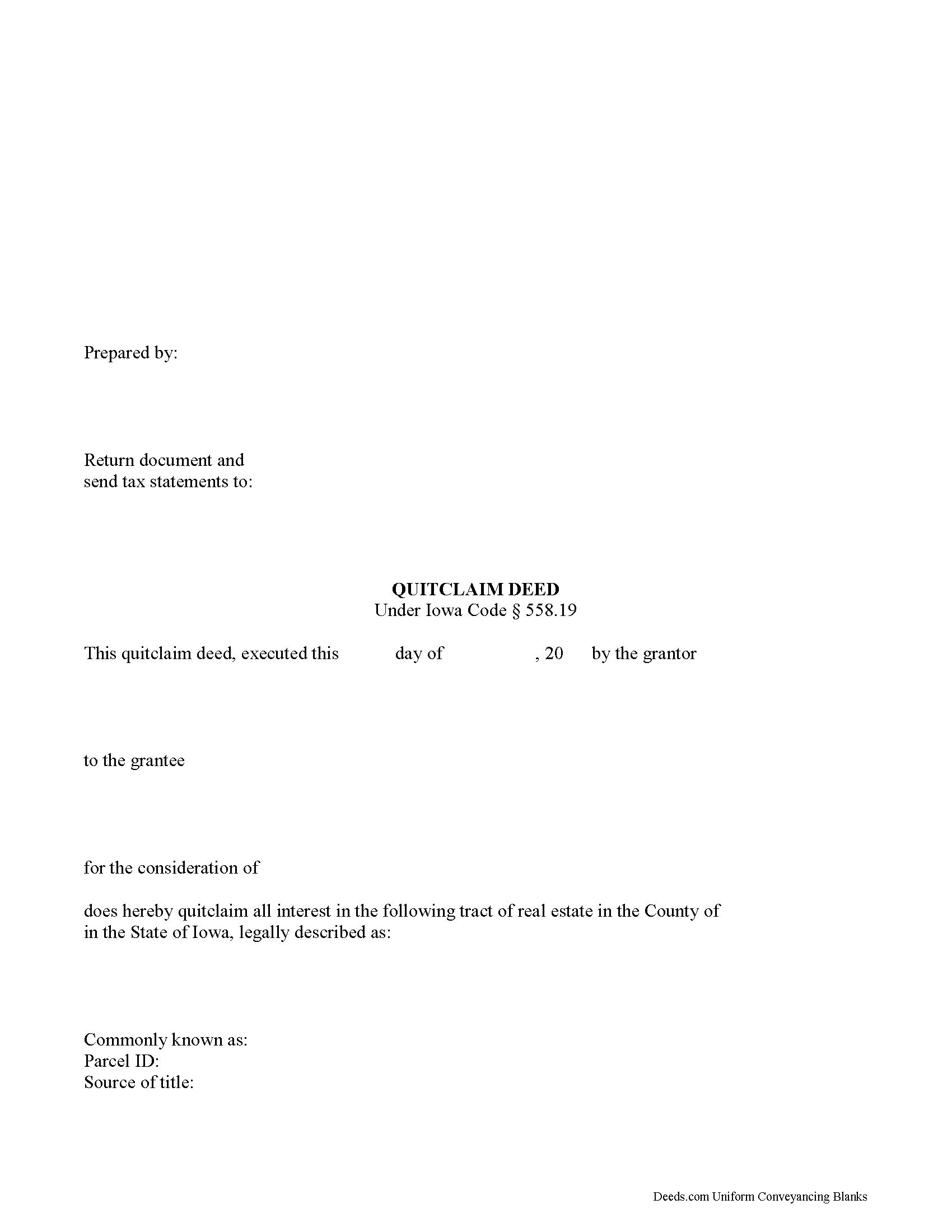
Iowa Code 558.19 provides the statutory form of a quitclaim deed. The minimum statutory contents are the names and addresses of all grantors and grantees, the consideration (usually money), and a complete legal description of the property. 561.13 adds the requirement for both spouses' signatures when conveying a property identified as a homestead, regardless of whether or not both have an ownership interest in the land. The grantor must sign the deed and all signatures must have the signor's name typed or printed underneath, and be acknowledged by a notary or other court-authorized individual. 331.606B lists the information that must be on the first page of every document submitted for recording. These include the name, address, and telephone number of the individual who prepared the quit claim deed, the name and address of the person to whom future tax statements should be mailed, a return address for use after recording, the title of the instrument (in this case, "Quitclaim Deed"), tax parcel ID, and a document number or book/page information for the conveyance that transferred the land to the grantor.
Recording:
Iowa Code 331.606B lists the statutory document formatting... More Information about the Iowa Quitclaim Deed
Gift Deed
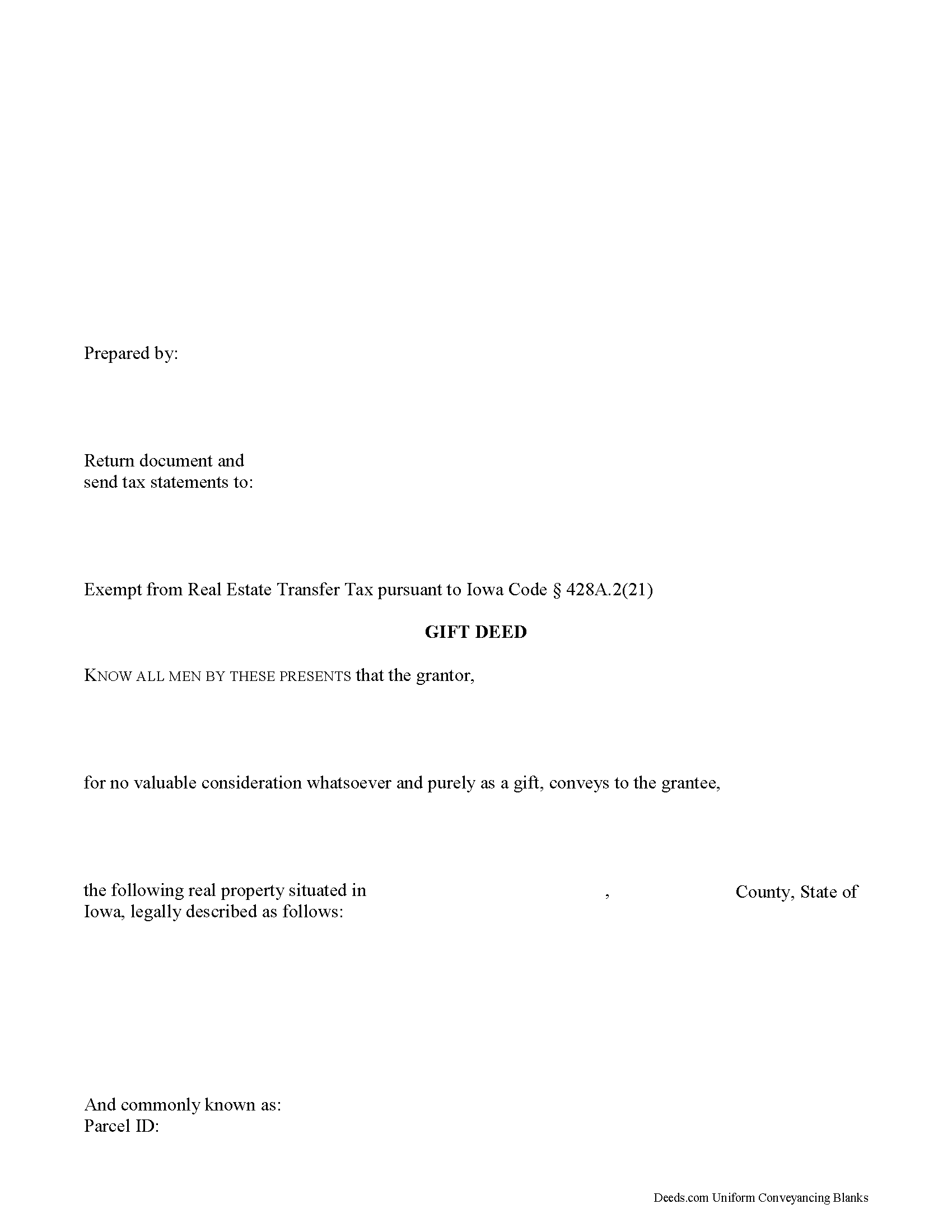
Gifts of Real Property in Iowa
Gift deeds convey title to real property from one party to another with no exchange of consideration, monetary or otherwise. Often used to transfer property between family members or to gift property as a charitable act or donation, these conveyances occur during the grantor's lifetime. Gift deeds must contain language that explicitly states that no consideration is expected or required. Ambiguous language, or references to any type of consideration, can make the gift deed contestable in court.
A lawful gift deed includes the grantor's full name and marital status, as well as the grantee's full name, marital status, vesting information, and mailing address. Vesting describes how the grantee holds title to the property. Generally, real property is owned in either sole ownership or co-ownership. For Iowa residential property, the primary methods for holding title are tenancy in common and joint tenancy. An estate conveyed to two or more people who are not married to each other is considered a tenancy in common unless otherwise specified. A conveyance to a married couple vests as joint tenancy with rights of survivorship unless otherwise stated (Io... More Information about the Iowa Gift Deed
Warranty Deed
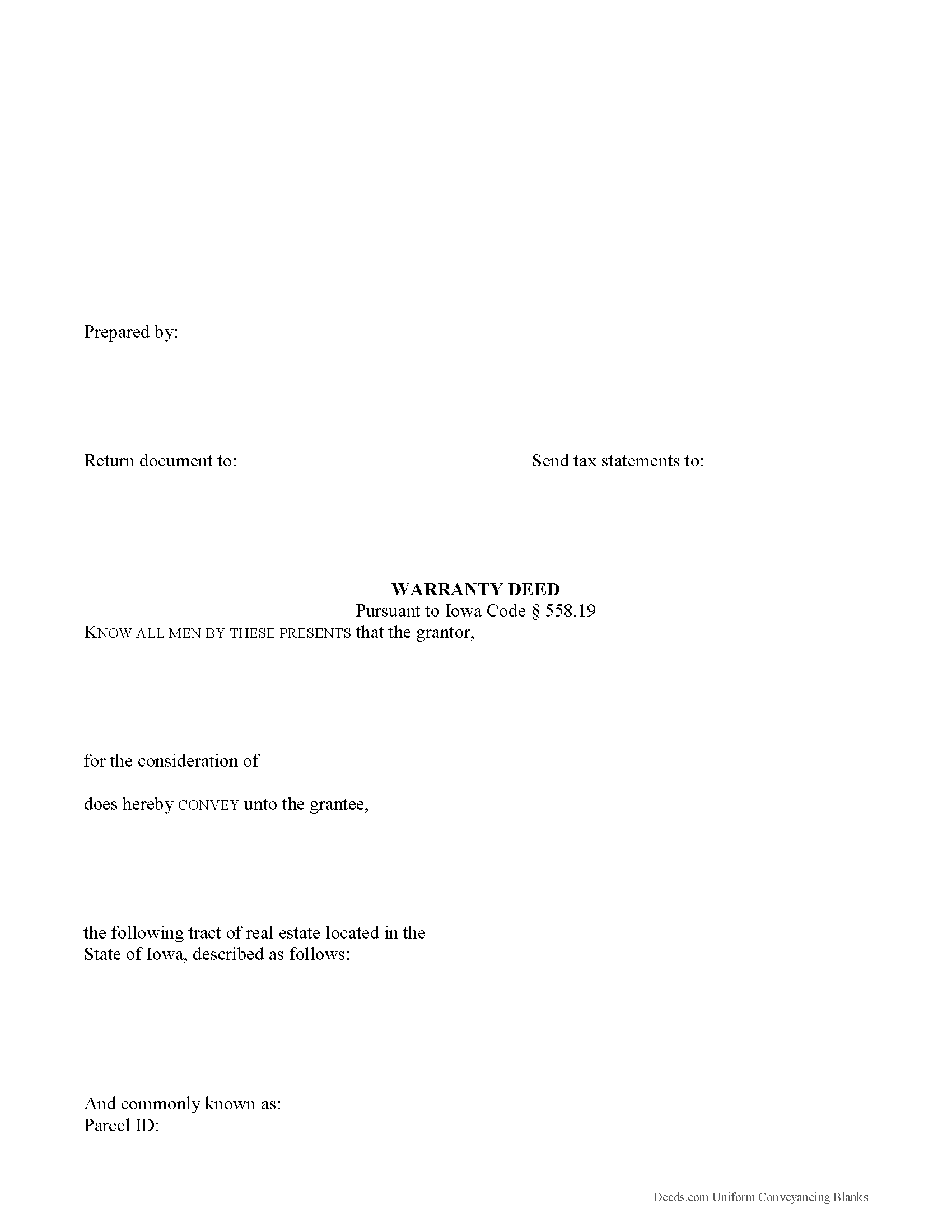
A warranty deed is a legal document used to transfer, or convey, rights in real property from a grantor (seller) to a grantee (buyer). This type of deed provides protection for the grantee by confirming that the grantor holds clear title to the real estate, has the right to sell the property to the grantee, and he or she will warrant the title against all persons whomsoever (Iowa Code 558.19). This guarantee extends throughout the property's history. The grantor also warrants that they did not encumber the property in a way prohibiting transfer, and that the deed references all easements, restrictions, or other agreements of record that relate to the specific parcel of land.
A lawful warranty deed includes the grantor's full name and marital status, as well as the grantee's full name, marital status, mailing address, and vesting. Vesting describes how the grantee holds title to the property. For Iowa residential property, the primary methods for holding title in co-ownership are tenancy in common and joint tenancy. A grant of ownership of real estate to two or more unmarried persons is presumed to create a tenancy in common, unless a joint tenancy is specifically created (557.1... More Information about the Iowa Warranty Deed
Special Warranty Deed
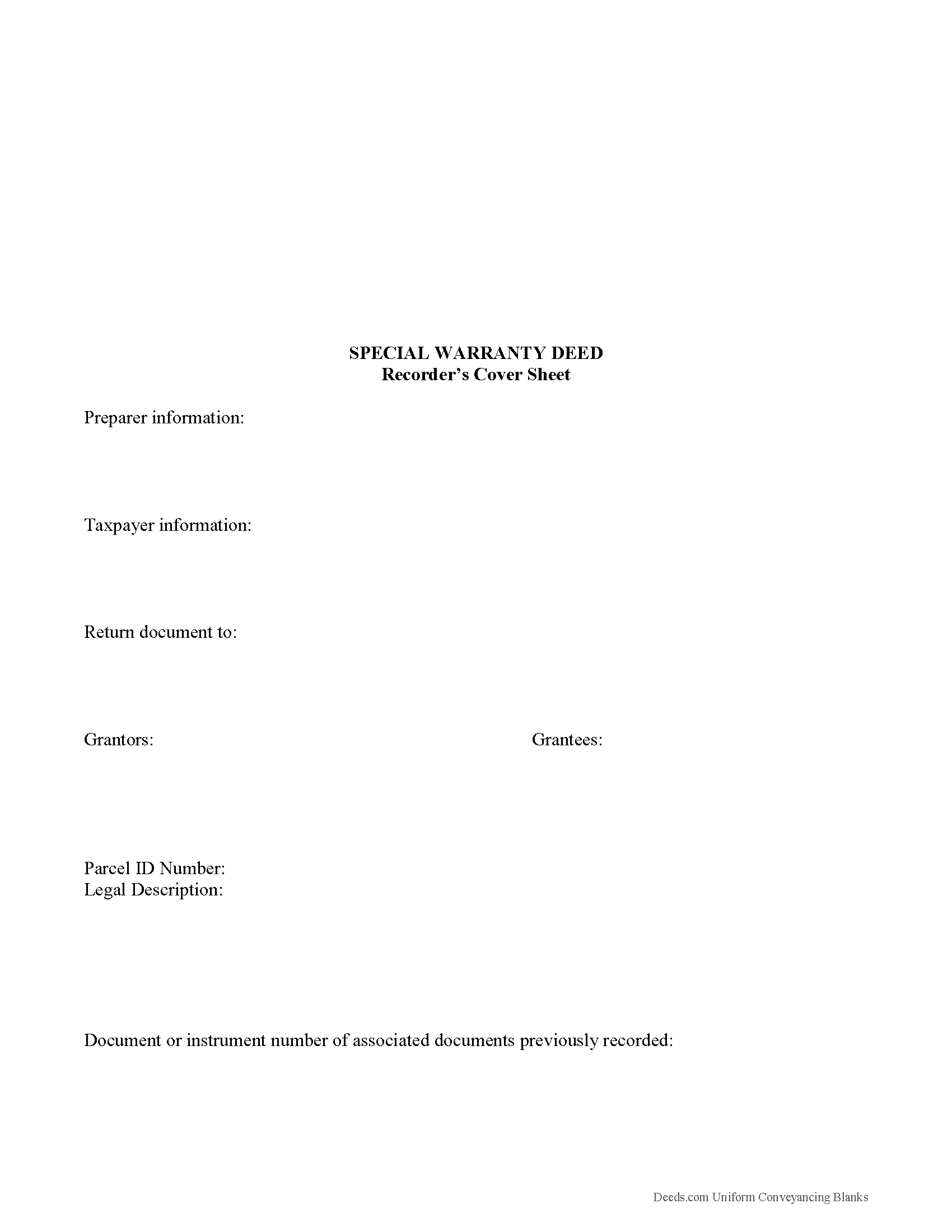
A special warranty deed is a legal document used to transfer, or convey, rights in real property from a grantor (seller) to a grantee (buyer). This type of deed provides more liability protection for the grantor, and less protection for the buyer. In a special warranty deed, the grantor warrants against defects in the title during his or her ownership, and that he or she is authorized to sell it, but does not guarantee freedom from claims on the title originating before the grantor owned the property. Because of this risk, special warranty deeds are less common for residential real estate transactions. Instead, these types of deeds are typically used for foreclosed bank-owned properties and commercial properties that have changed ownership several times.
A lawful deed includes the grantor's full name and marital status, as well as the grantee's full name, marital status, mailing address, and vesting. Vesting describes how the grantee holds title to the property. For Iowa residential property, the primary methods for holding title in co-ownership are tenancy in common and joint tenancy. A grant of ownership of real estate to two or more unmarried persons is presumed to create a t... More Information about the Iowa Special Warranty Deed
Grant Deed
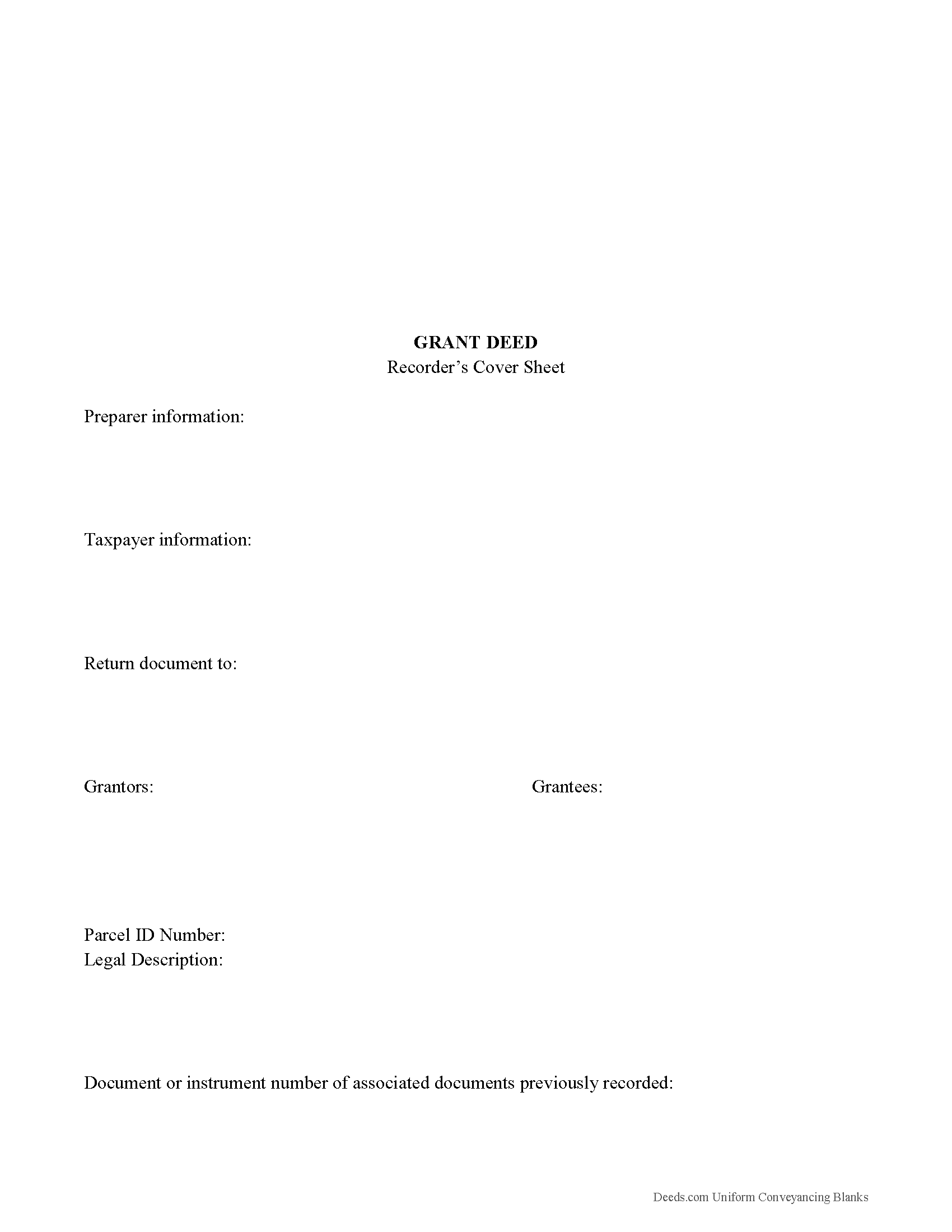
A grant deed is a legal document used to transfer, or convey, rights in real property from a grantor (seller) to a grantee (buyer). It contains implied covenants that the grantor has not previously sold the real property interest now being conveyed, and that the property is being conveyed without any undisclosed liens or encumbrances. Grant deeds typically do not require the grantor to defend claims against the title.
A lawful deed includes the grantor's full name and marital status, as well as the grantee's full name, marital status, mailing address, and vesting. Vesting describes how the grantee holds title to the property. For Iowa residential property, the primary methods for holding title in co-ownership are tenancy in common and joint tenancy. A grant of ownership of real estate to two or more unmarried persons is presumed to create a tenancy in common, unless a joint tenancy is specifically created (Iowa Code 557.15). A transfer to a married couple vests as a joint tenancy, unless otherwise stated (Iowa Code 557.15(3)(a)).
As with any conveyance of real estate, a grant deed requires a complete legal description of the parcel. Recite the source of title to establish a... More Information about the Iowa Grant Deed
Correction Deed
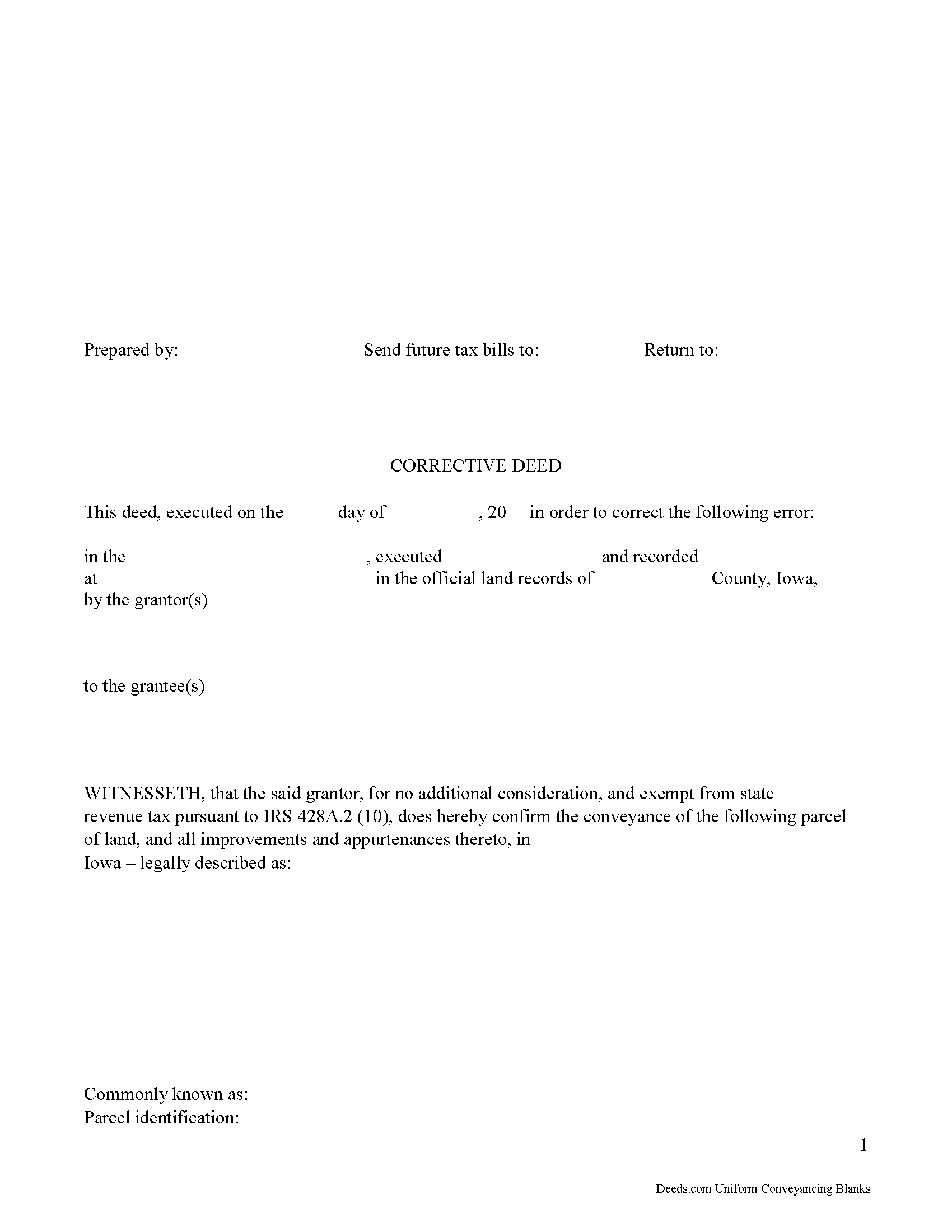
In Iowa, use a correction deed to amend a previously recorded deed that contains a minor error.
A corrective deed is, in effect, an explanation and correction of an error in a prior instrument. As such, it passes no title and, except for the corrected item, reiterates and confirms the prior conveyance. It should be executed from the original grantor to the original grantee, and it needs to be recorded in order to be legally valid.
The correction deed must reference the original conveyance by type of error, date of execution and recording, as well as by recording number and location. Beyond that, it restates the information given in the prior deed, which remains on record and receives a cross-reference to the corrective instrument.
Deeds of correction are most appropriate for minor errors and omissions in the original deed, such as misspelled names, omission of marital status, or typos in the legal description. More substantial changes, such as adding a name to the title, changing the vesting information or the legal description of the property, may require a new deed of conveyance instead of a correction deed.
Correction deeds are exempt from state revenue tax pursua... More Information about the Iowa Correction Deed
Easement Deed
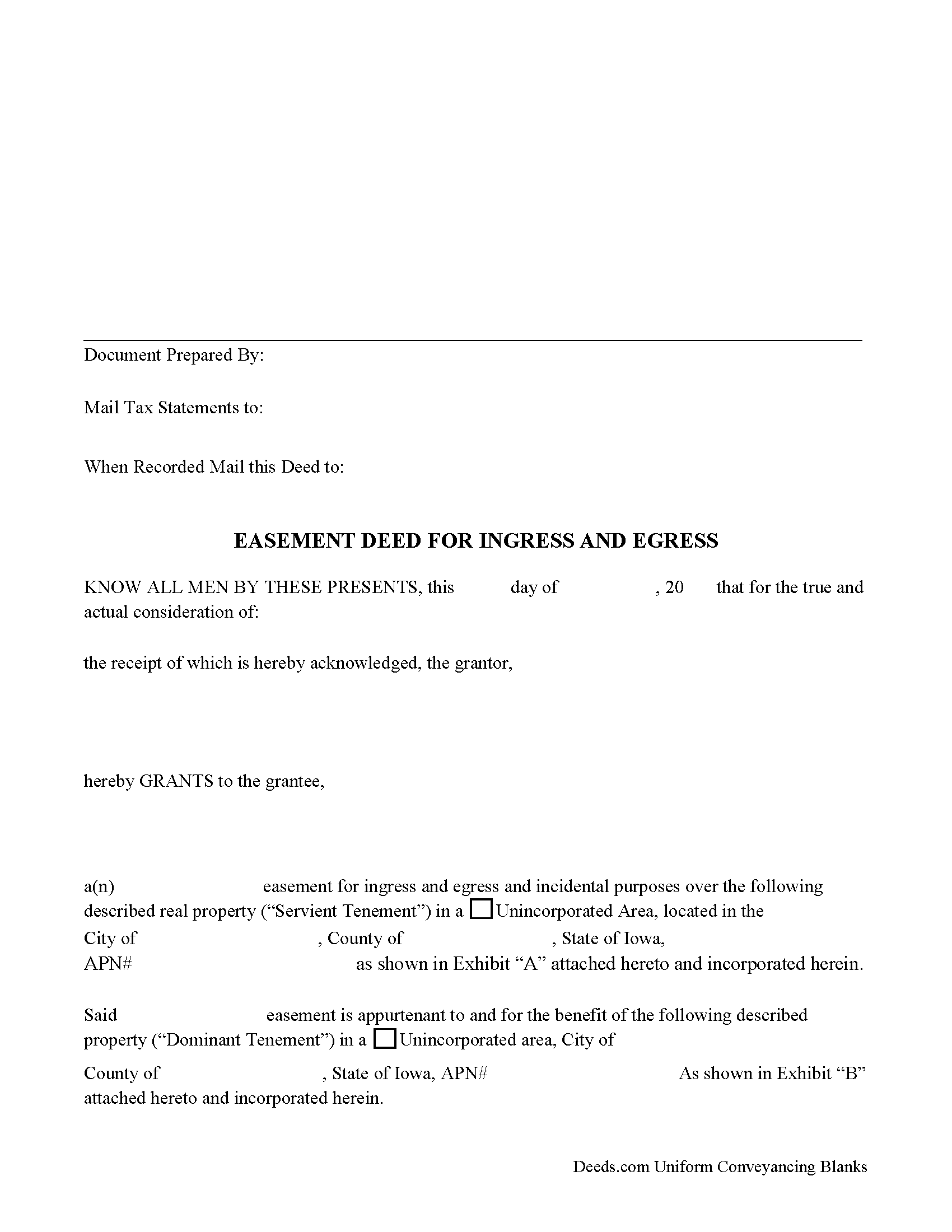
An easement is the right to use another person's real property for a specific purpose. There are four ways to create an easement in Iowa: by an express grant or reservation, by prescription, by necessity, and by implication. Solar easements may also be granted in Iowa. To obtain such an easement, an owner of real property may apply to the solar access regulatory board for an order granting a solar access easement. The application must be filed according to 564A.4 of the Iowa Code.
When any person is in the use of a way, privilege, or other easement in the land of another, the owner of the land in such case may give notice in writing to the person claiming or using the way, privilege, or easement of the owner's intention to dispute any right arising from such claim or use (564.4). The notice to prevent acquisition, when served and recorded as provided, will be an interpretation of such use, and prevent the acquiring of any right thereto by the continuance thereof (564.5).
Similar to other real property interests, an easement must be signed and acknowledged by the grantor. The deed will not be deemed lawfully recorded until it has been previously acknowledged or proved in the... More Information about the Iowa Easement Deed
Termination, Cancellation of Easement / Right of Way
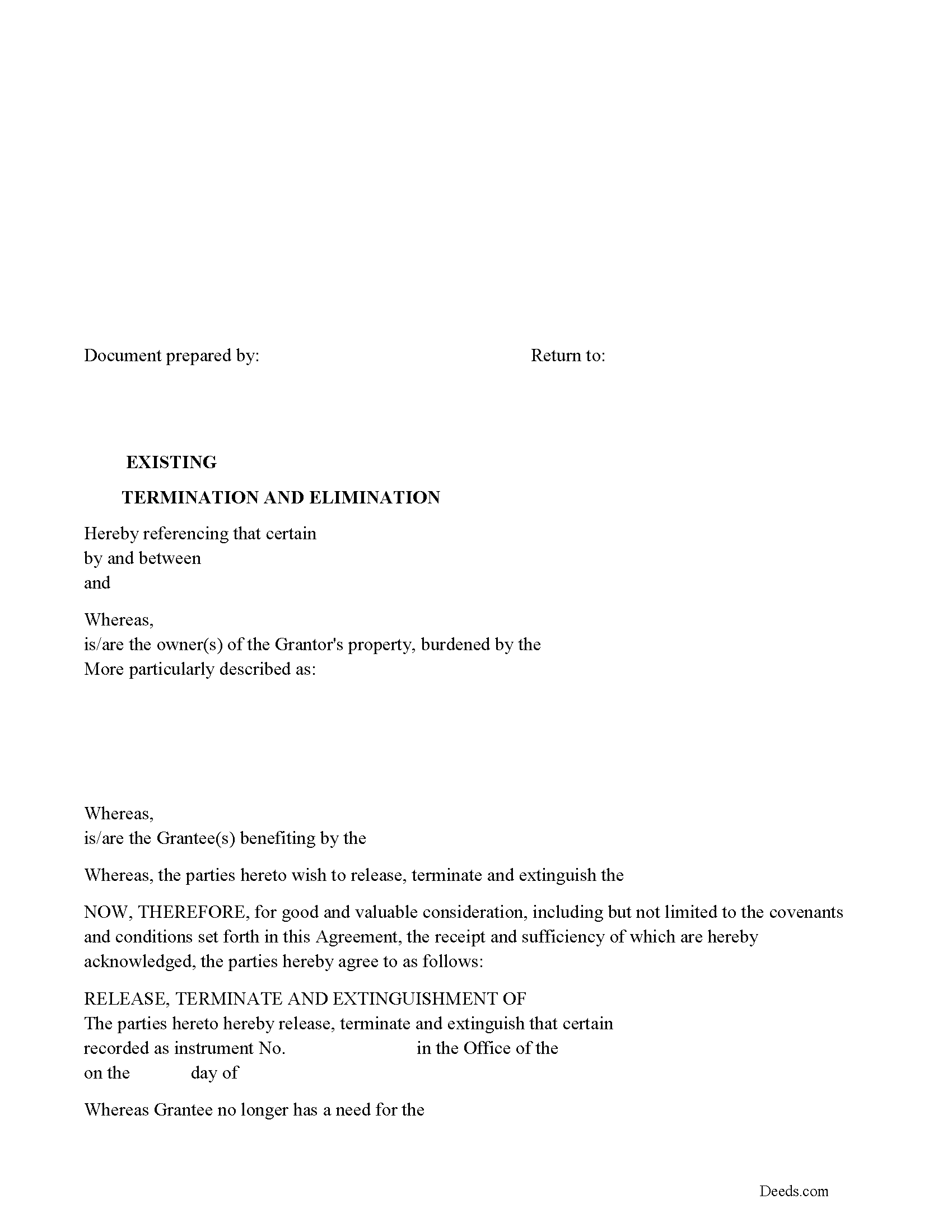
Use this form to release, terminate, extinguish a previously recorded document that involves access to and from a property.
Documents such as:
1. Easement Deeds or Agreements (An easement is a non-possessory interest in land, granting the right to use someone else's property for a specific purpose, like a driveway or utility line)
2. Access Roads
3. Right of Ways
4. Utility Easements (Power, Gas, Water, Sewer, Etc.)
5. Drainage Easements
This document allows the owner of the land, burdened by the access and the party that benefits from the access, to sign an agreement releasing the property from such access, ... More Information about the Iowa Termination, Cancellation of Easement / Right of Way
Affidavit of Surviving Joint Tenant
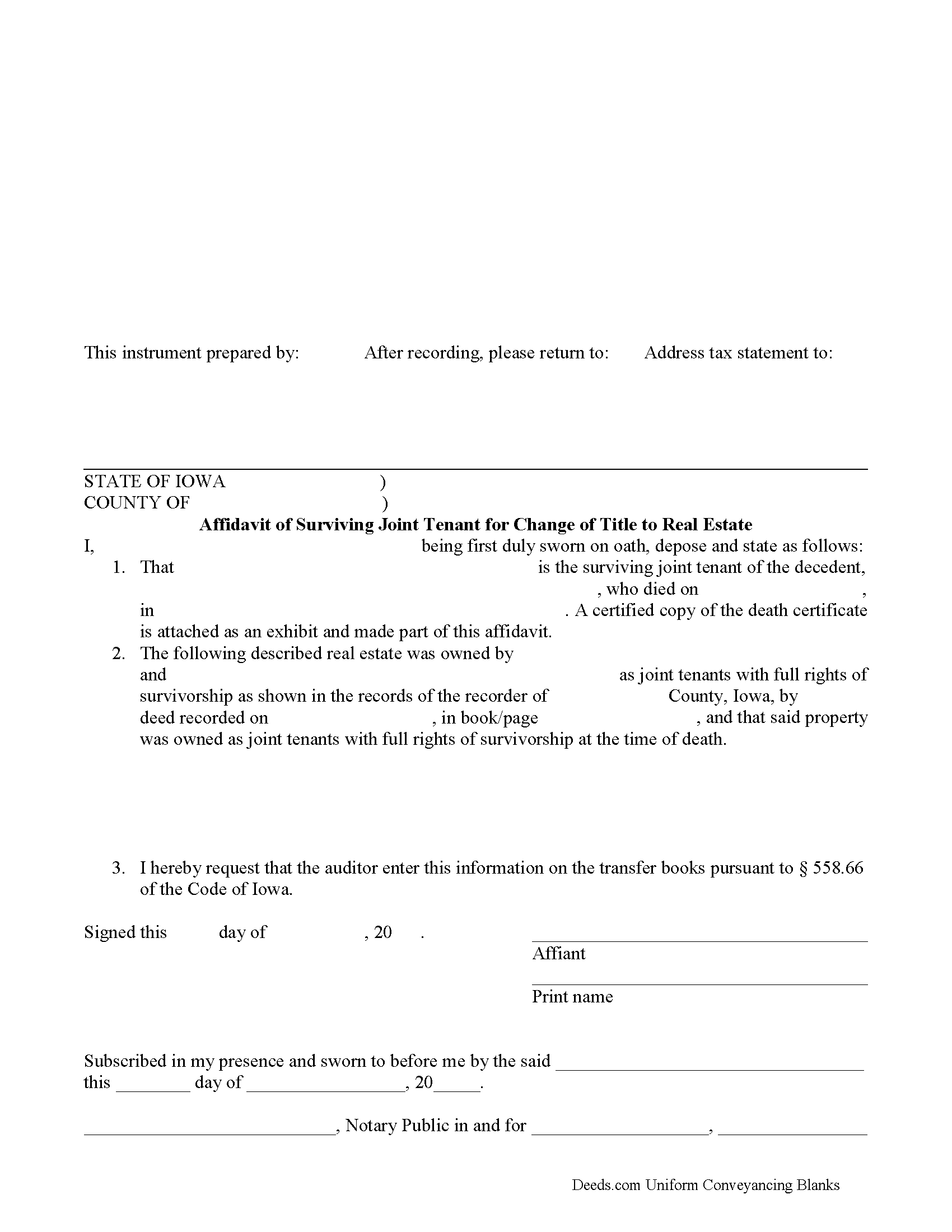
Transferring Title to Iowa Real Estate after a Joint Tenant Dies
Joint tenancy is a form of ownership where two or more people share title rights to a specific parcel of real property. If one joint tenant dies, his/her portion of property rights transfers to the remaining owners by function of law. If there are multiple surviving co-owners, they each receive an equal share of the rights. Property held in joint tenancy does not pass to the owners' estates in a will. Therefore, it avoids distribution via the probate process.
Iowa Code 558.66 (2013) governs the different requirements for completing the transfer of title rights under joint tenancy. Specifically, the living joint tenant may execute and record an affidavit of surviving joint tenant, which the recorder attaches to the previously recorded deed. An affidavit is a document containing statements, made under oath, which identify the person presenting the material (affiant); the name of the surviving co-owner (often the affiant); details about the deceased owner; the legal description of the property being transferred; recording information from the deed granting joint tenancy; and a request to update the records with th... More Information about the Iowa Affidavit of Surviving Joint Tenant
Trustee Warranty Deed
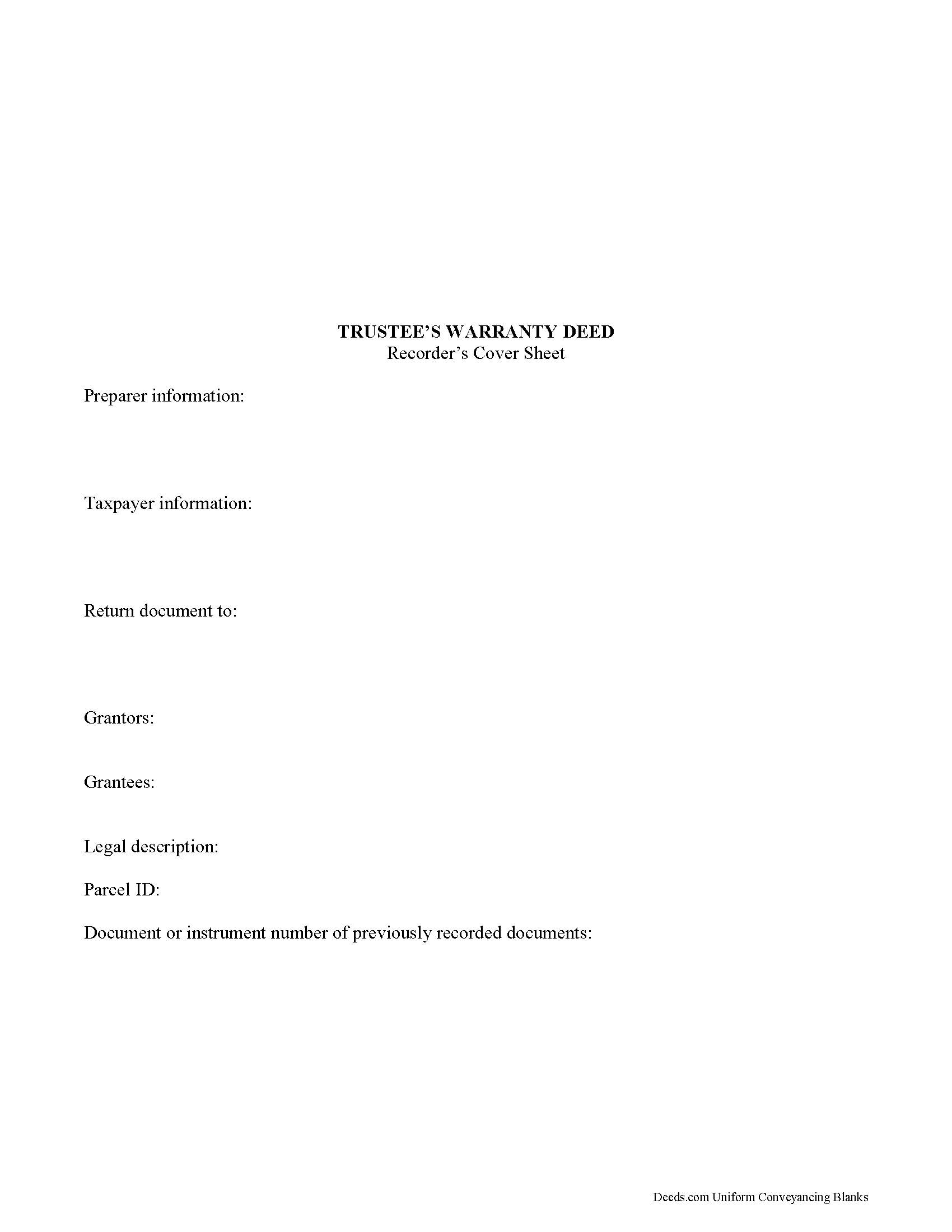
The Iowa trustee's deed is a form of conveyance used to move real property out of a trust.
Generally, the trustee's deed is named for the person executing the document, rather than for the warranties of title contained within. In Iowa, however, trustee's deeds carry certain covenants that, when paired with an affidavit of trustee under Iowa Code 614.14, secure the purchaser against adverse claims. Because of this, Iowa's trustee's deeds are often labelled "Trustee's Warranty Deed."
The trustee is the person designated in the trust instrument as the trust's administrator. The trust instrument is executed by the settlor, who, in addition to setting out the provisions of the trust, funds the trust with assets, which may include real estate. The trust instrument also identifies the trust's beneficiaries, who will receive income from the trust and/or trust property after the settlor's death.
In a trustee's deed, the trustee fulfills the role of the grantor. The deed provides the name and date of the trust under which the trustee is acting, and references the prior deed under which the trustee was granted title to the property. As with other instruments affecting real property... More Information about the Iowa Trustee Warranty Deed
Court Officer Deed
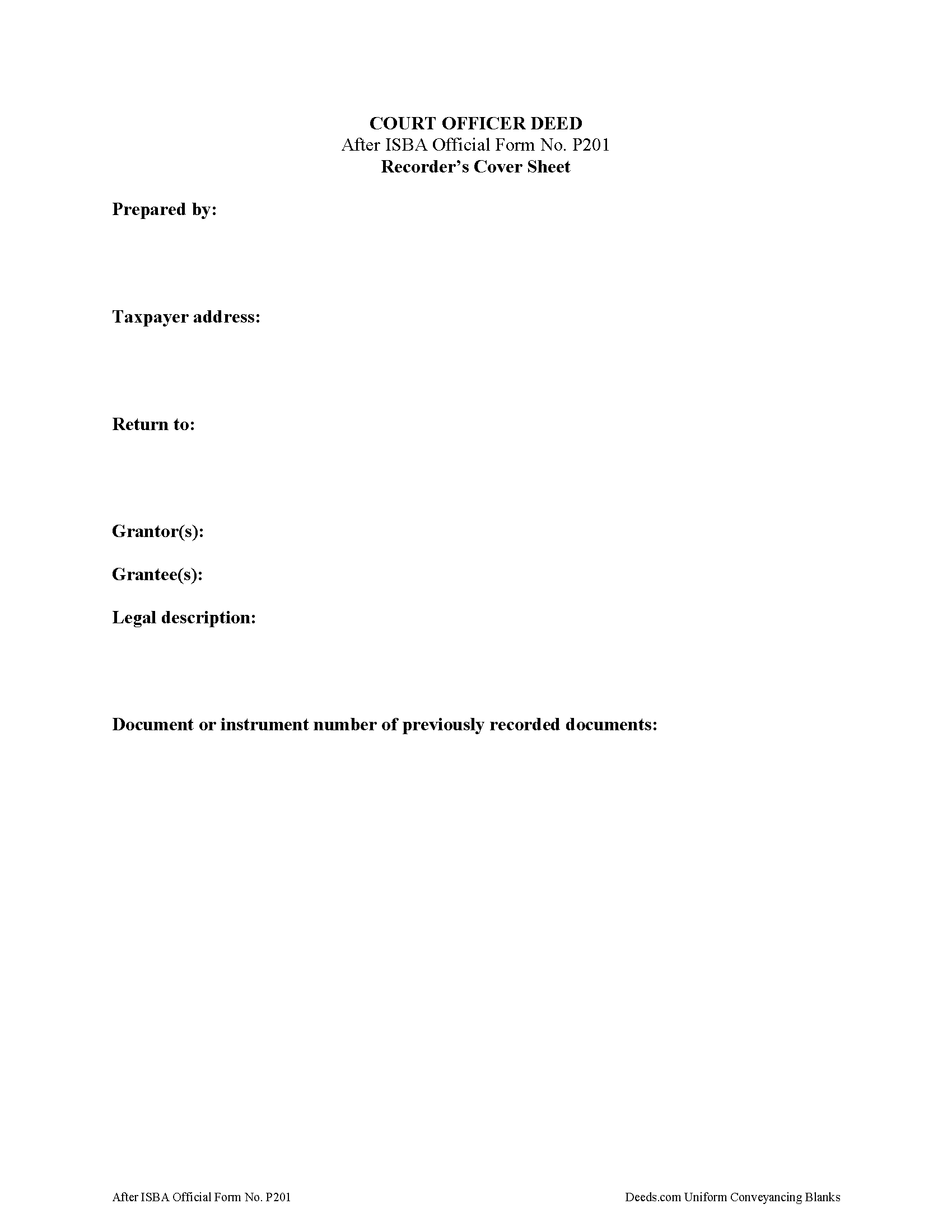
When a property owner dies in Iowa, title to his or her real property passes by means of the decedent's will, or, in the absence of a will, via the laws of intestate succession established in the probate code, codified at chapter 633 of the Iowa Code.
Probate is the court procedure through which a decedent's will is proved and his or her estate is settled. The probate process takes place in the county in which the decedent was domiciled at the time of his or her death.
Pursuant to designation in the decedent's will or priority to administer the decedent's estate, as established by Iowa Code 633.227, the court appoints a personal representative (PR) who will oversee the estate's administration. The PR is either called an executor, when named by a decedent's will, or an administrator, in the absence of a will or lack of designation in a will. Regardless, the fiduciary duties of the personal representative remain the same, including marshalling the decedent's assets, paying debts and valid claims on the estate, and distributing the remainder of the estate to beneficiaries.
Title to real property that does not transfer outside of the probate process by means of a survivorship ... More Information about the Iowa Court Officer Deed
Affidavit of Individual Trustee
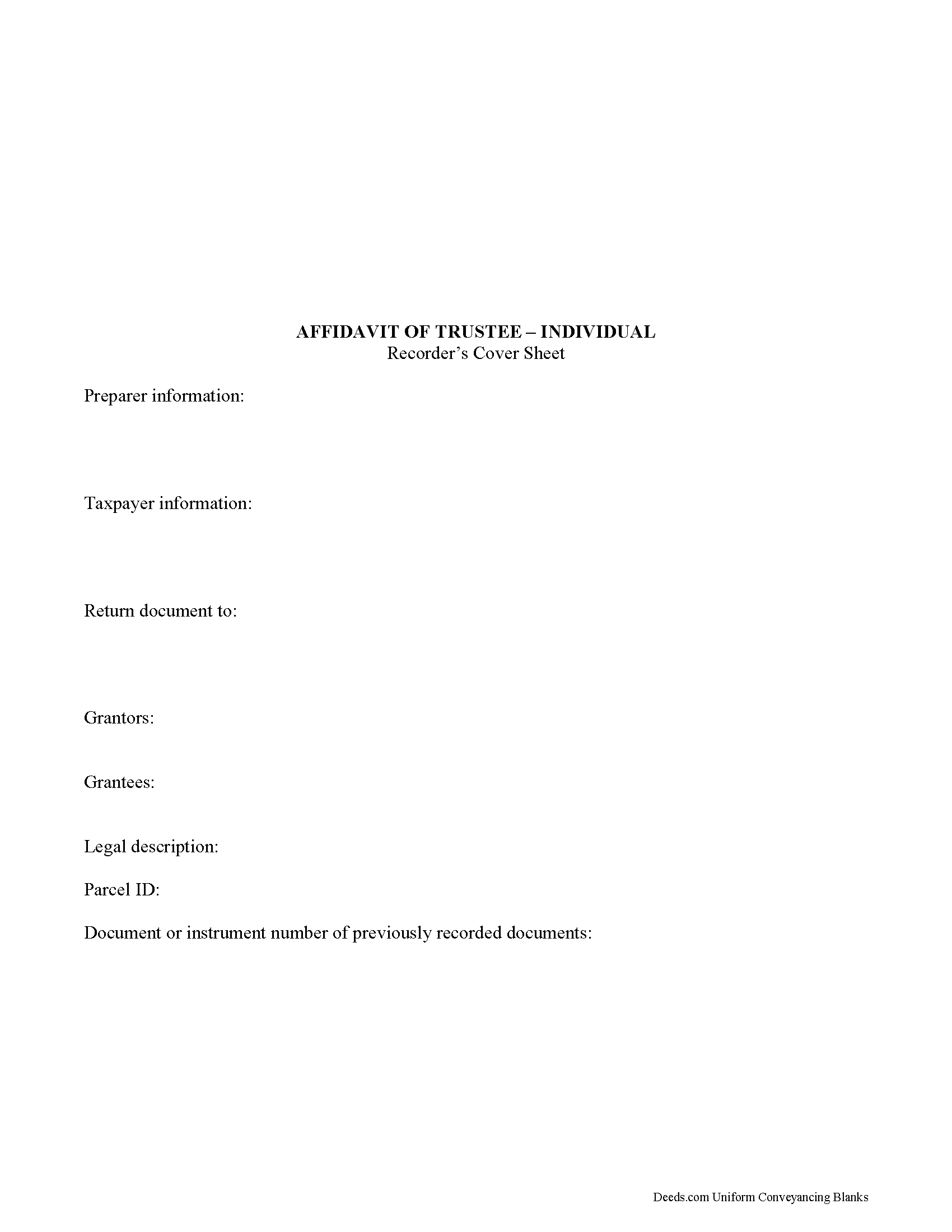
Under Iowa Code 614.14, the affidavit of individual trustee is used in conjunction with a trustee's deed executed by an individual trustee. The affidavit is a sworn statement confirming the title held by the trustee is free and clear of adverse claims. It is recorded and presented to the purchaser for recording along with the trustee's deed.
(Iowa Affidavit of Individual Trustee Package includes form, guidelines, and completed example) Consult a lawyer with questions about trustee's deeds and affidavits.
... More Information about the Iowa Affidavit of Individual Trustee
Affidavit of Corporate Trustee
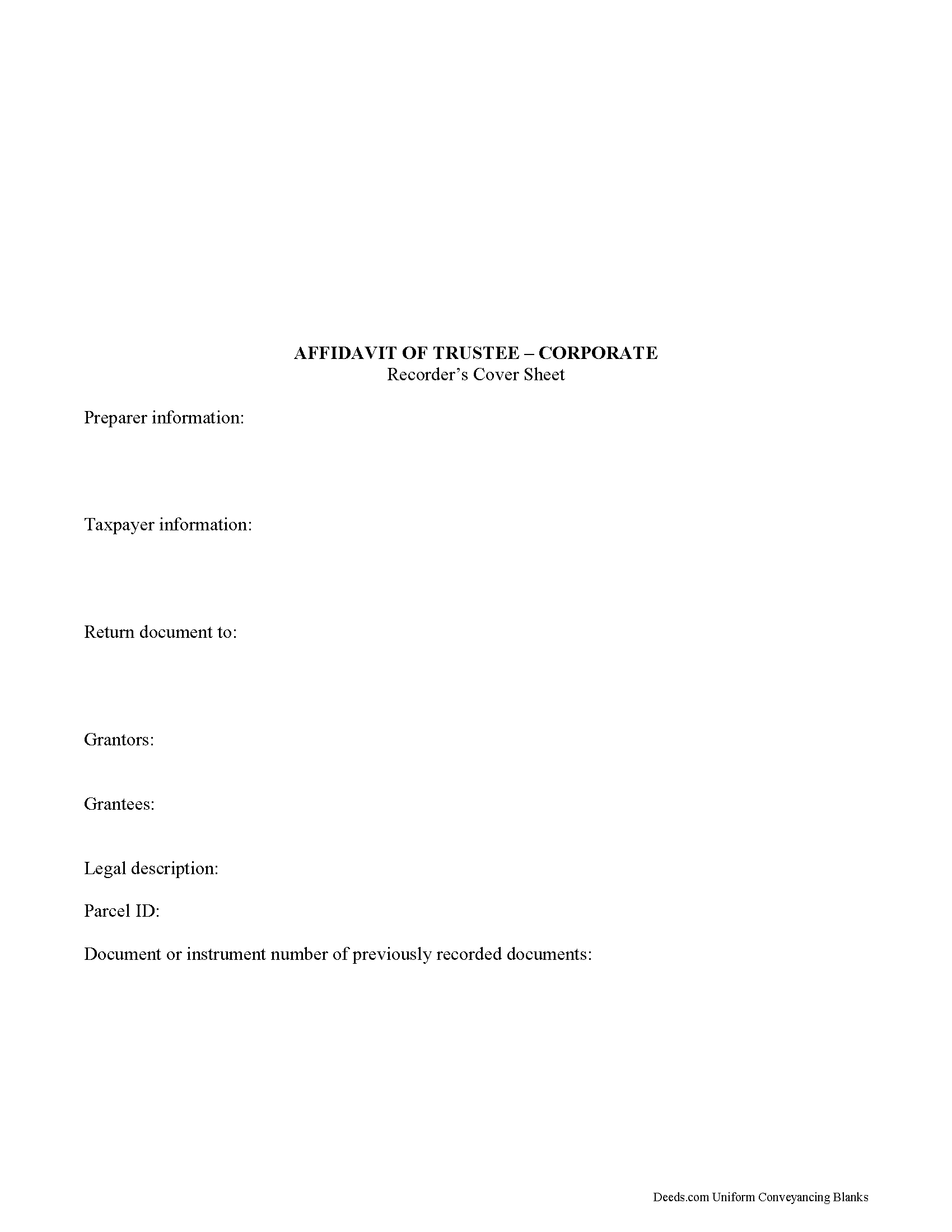
Under Iowa Code 614.14, the affidavit of corporate trustee is used in conjunction with a trustee's deed executed by a corporate trustee. The affidavit is a sworn statement confirming the title held by the corporate trustee is free and clear of adverse claims. It is recorded and presented to the purchaser along with the trustee's deed.
(Iowa Affidavit of Corporate Trustee Package includes form, guidelines, and completed example) Consult a lawyer with questions about corporate trustee's deeds and affidavits.
... More Information about the Iowa Affidavit of Corporate Trustee
Purchaser Affidavit
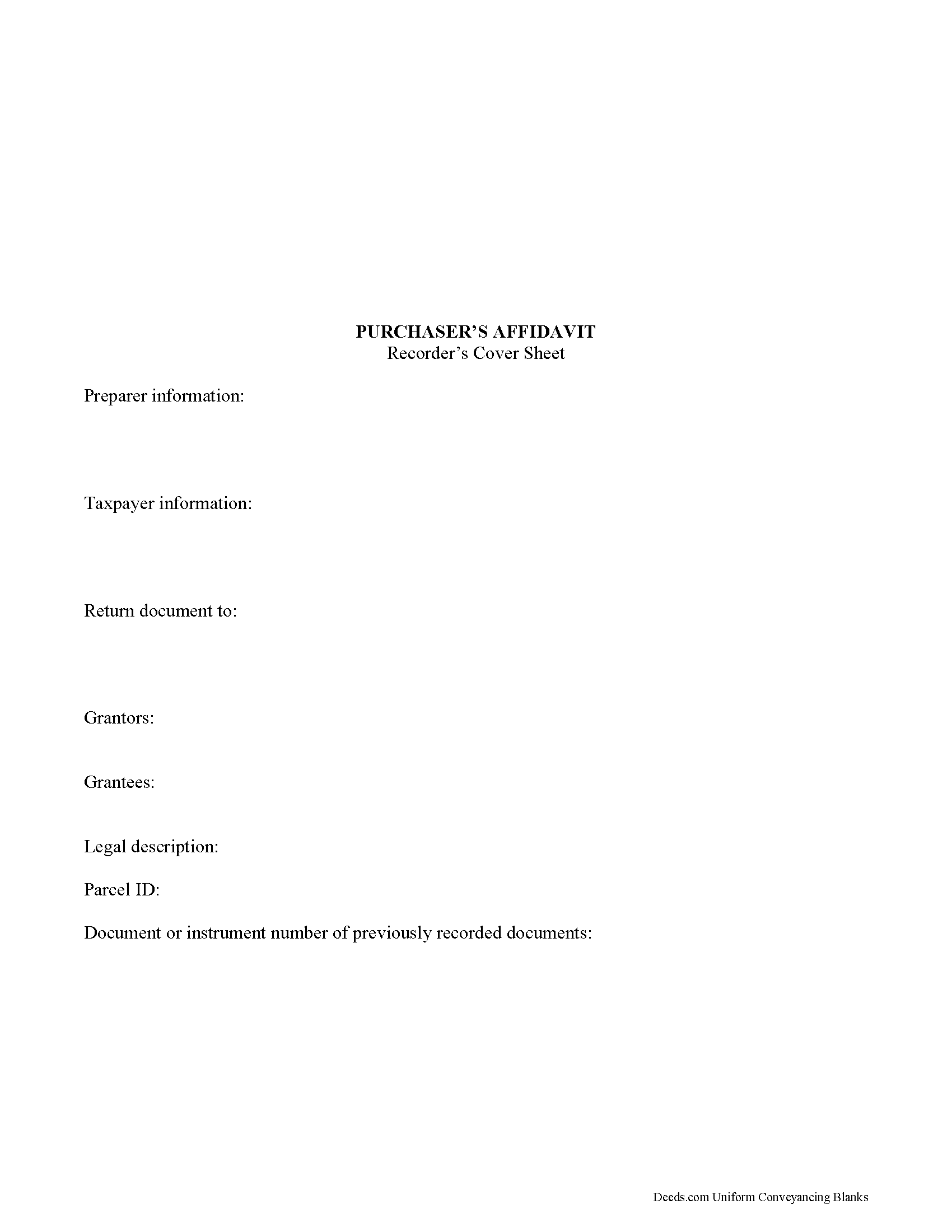
Some situations may require the purchaser under a trustee's deed to record a purchaser's affidavit along with the trustee's deed and trustee's affidavit.
The purchaser's affidavit is executed by the grantee of a trustee's deed and acknowledges receipt of a trustee's affidavit under Iowa Code 614.14.
(Iowa Purchasers Affidavit Package includes form, guidelines, and completed example) Consult a lawyer with questions about trustee's deeds and affidavits.... More Information about the Iowa Purchaser Affidavit
Mineral Deed
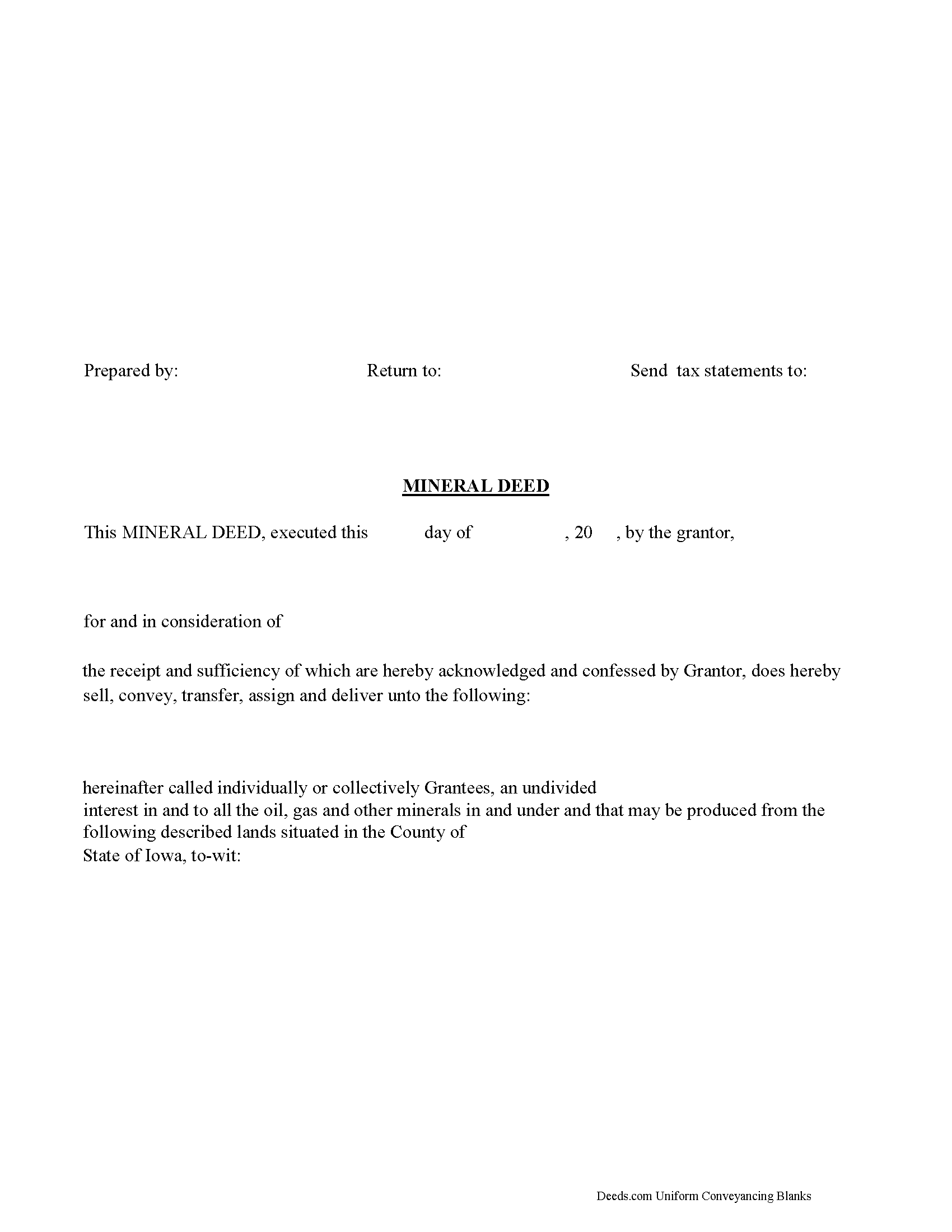
The General Mineral Deed in Iowa transfers oil, gas, and mineral rights from the grantor to the grantee. THIS IS NOT A LEASE. There are no Exceptions or Reservations included.
The transfer includes the oil, gas and other minerals of every kind and nature. It also transfers any and all rights to receive royalties, overriding royalties, net profits interests or other payments out of or with respect to those oil, gas and other minerals. The Grantor can stipulate the percentage of Mineral Rights the Grantee will receive and is made subject to any rights existing under any valid and subsisting oil and gas lease or leases of record.
This general mineral deed gives the grantee the right to access, for the purpose of mining, drilling, exploring, operating and developing said lands for oil, gas, and other minerals, and storing handling, transporting and marketing of such.
In this document the Grantor Warrants and will defend said Title to Grantee. Use of this document has a permanent effect on your rights to the property, if you are not completely sure of what you are executing seek the advice of a legal professional.
(Iowa Mineral Deed Package includes form, guidelines, and com... More Information about the Iowa Mineral Deed
Mineral Deed with Quitclaim Covenants
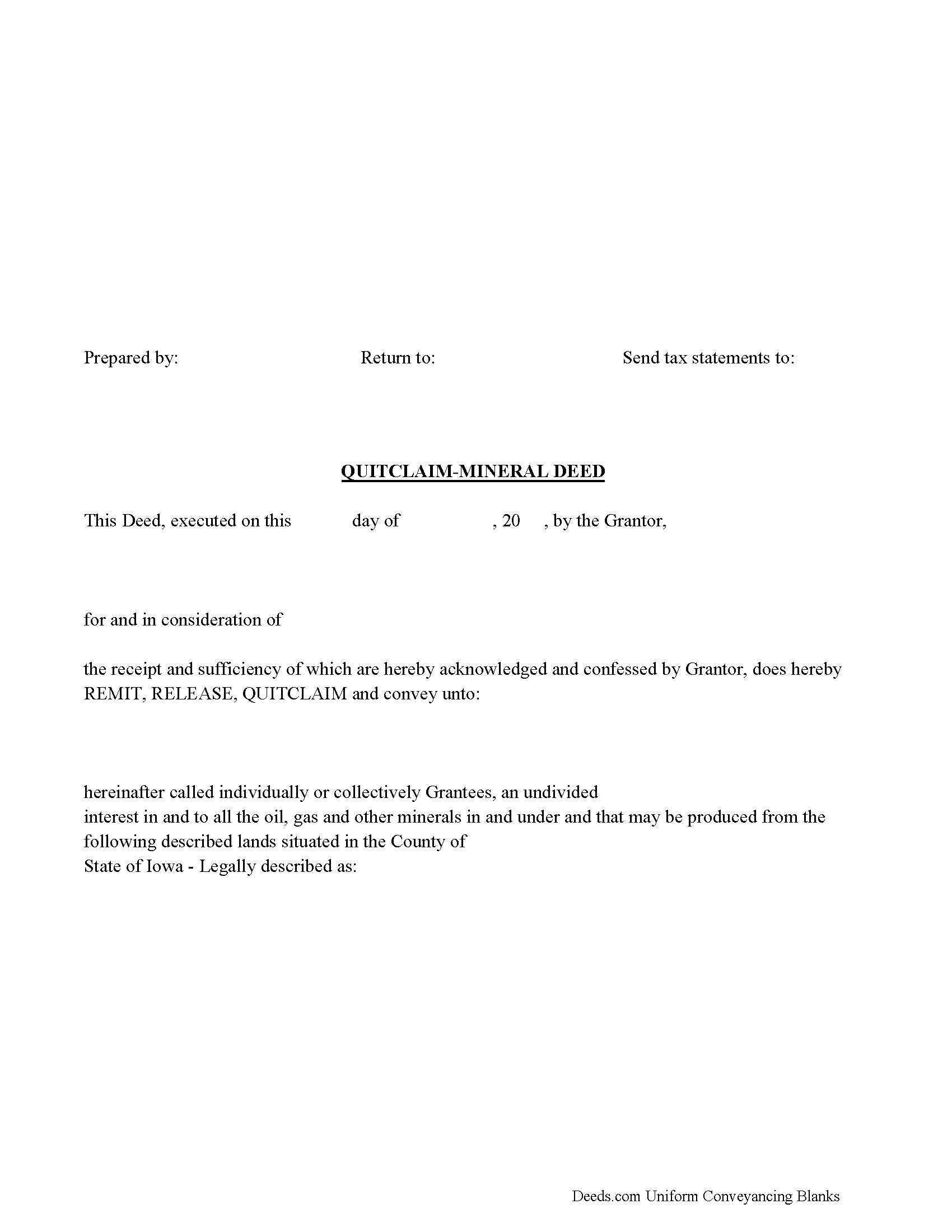
The General Mineral Deed in Iowa Quitclaims oil, gas, and mineral rights from the grantor to the grantee. THIS IS NOT A LEASE. There are no Exceptions or Reservations included.
The transfer includes the oil, gas and other minerals of every kind and nature. The Grantor can stipulate the percentage of Mineral Rights the Grantee will receive.
This general mineral deed gives the grantee the right to access, for the purpose of mining, drilling, exploring, operating and developing said lands for oil, gas, and other minerals, and storing handling, transporting and marketing of such.
The seller, or grantor Quitclaims the mineral rights and does NOT accept responsibility to any discrepancy of title (This assignment is without warranty of title, either express or implied)
Uses: Mineral deeds with quitclaim are often used in situations where the grantor wants to quickly release any interest they might have in mineral rights, such as in settling estates, resolving disputes, clearing up uncertainties about ownership in a title's history or when mineral rights have previously been severed or fragmented from surface rights and cloud a title, making it difficult to transfer property. R... More Information about the Iowa Mineral Deed with Quitclaim Covenants
Real Estate Mortgage and Promissory Note
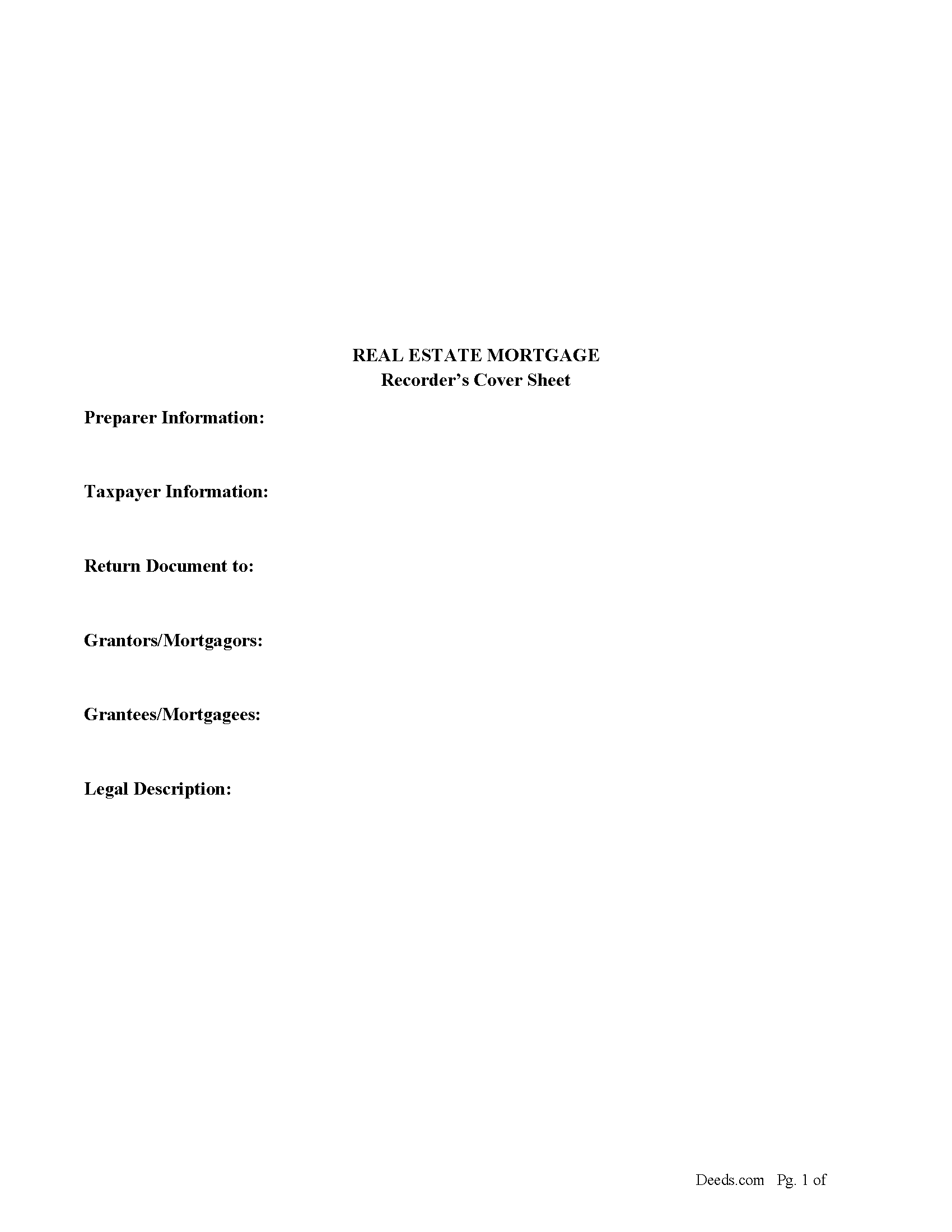
Use these forms to finance real property - vacant land, residential, condominiums, small commercial, rental and planned unit developments. This mortgage has the option of being used as a purchase money mortgage defined by Iowa Code 654.12b (shall have priority over and is senior to preexisting judgments against the purchaser and any other right, title, interest, or lien arising either directly or indirectly by, through, or under the purchaser.) (IC654.12b(1))
[A mortgage is a purchase money mortgage to the extent it is either:
a. Taken or retained by the seller of the real estate to secure all or part of its price, including all costs in connection with the purchase.
b. Taken by a lender who, by making an advance or incurring an obligation, provides funds to enable the purchaser to acquire rights in the real estate, including all costs in connection with the purchase, if the funds are in fact so used. Except when it is a refinancing of an existing purchase money mortgage between the same lender and purchaser and no new funds are advanced, a mortgage given to secure funds which are used to pay off another mortgage is not a purchase money mortgage.
2. If more than one purchas... More Information about the Iowa Real Estate Mortgage and Promissory Note
Release of Real Estate Mortgage
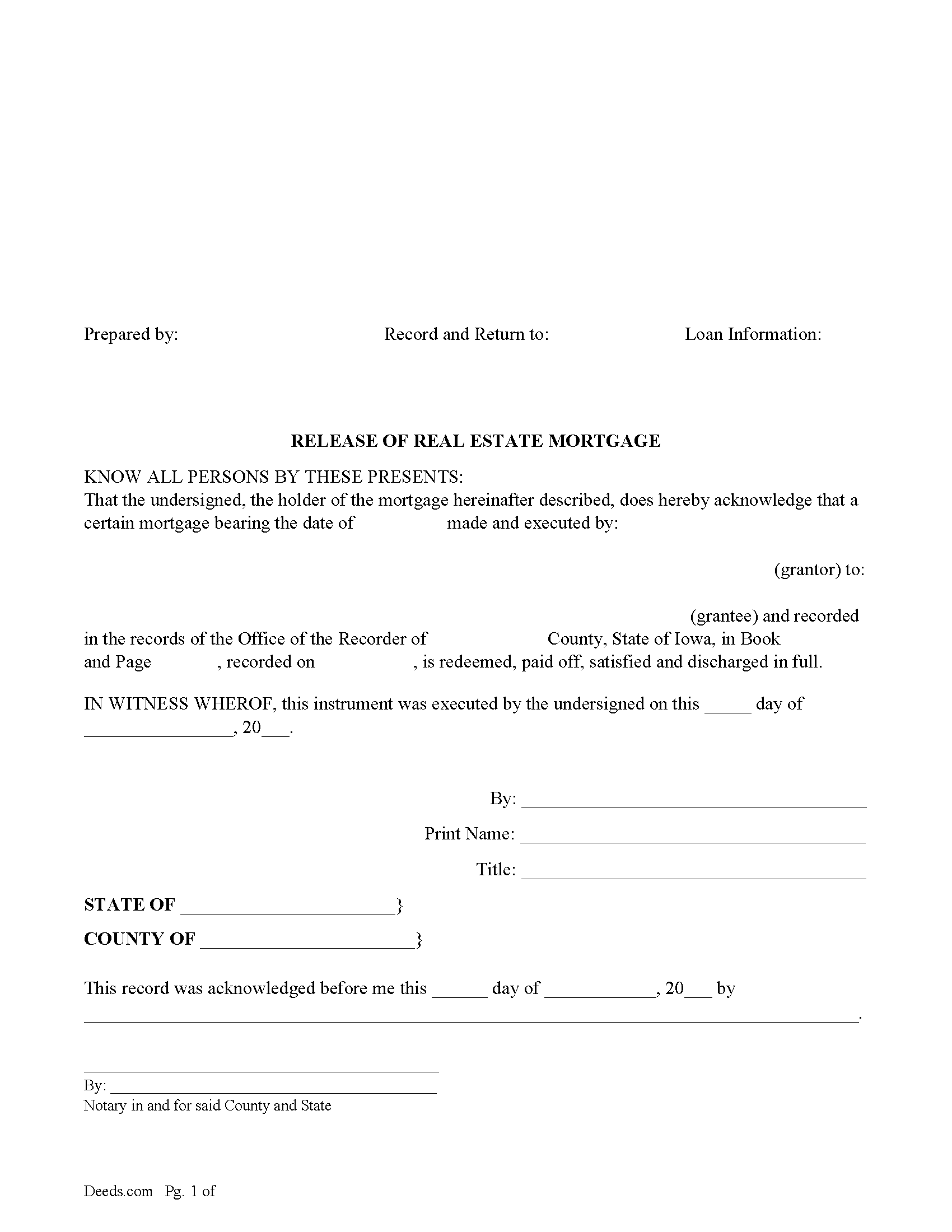
This form is used by the current lender/mortgagee, (the mortgagee's personal representative or assignee, or those legally acting for the mortgagee, and in case of payment of a school fund mortgage the county auditor, within thirty days of payment in full, shall acknowledge satisfaction thereof by execution of an instrument of satisfaction which is in writing, refers to the mortgage, and is duly acknowledged and recorded.) (Iowa Code 655.1)
Iowa Code 655.5 -- Instrument of satisfaction
When the judgment is paid in full, the mortgagee shall file with the clerk a satisfaction of judgment which shall release the mortgage underlying the action. A mortgagee who fails to file a satisfaction within thirty days of receiving a written request shall be subject to reasonable damages and a penalty of five hundred dollars plus reasonable attorney fees incurred by the aggrieved party, to be recovered in an action for the satisfaction by the party aggrieved.
(Iowa Release of Mortgage Package includes form, guidelines, and completed example) For use in Iowa only.
... More Information about the Iowa Release of Real Estate Mortgage
Assignment of Real Estate Mortgage
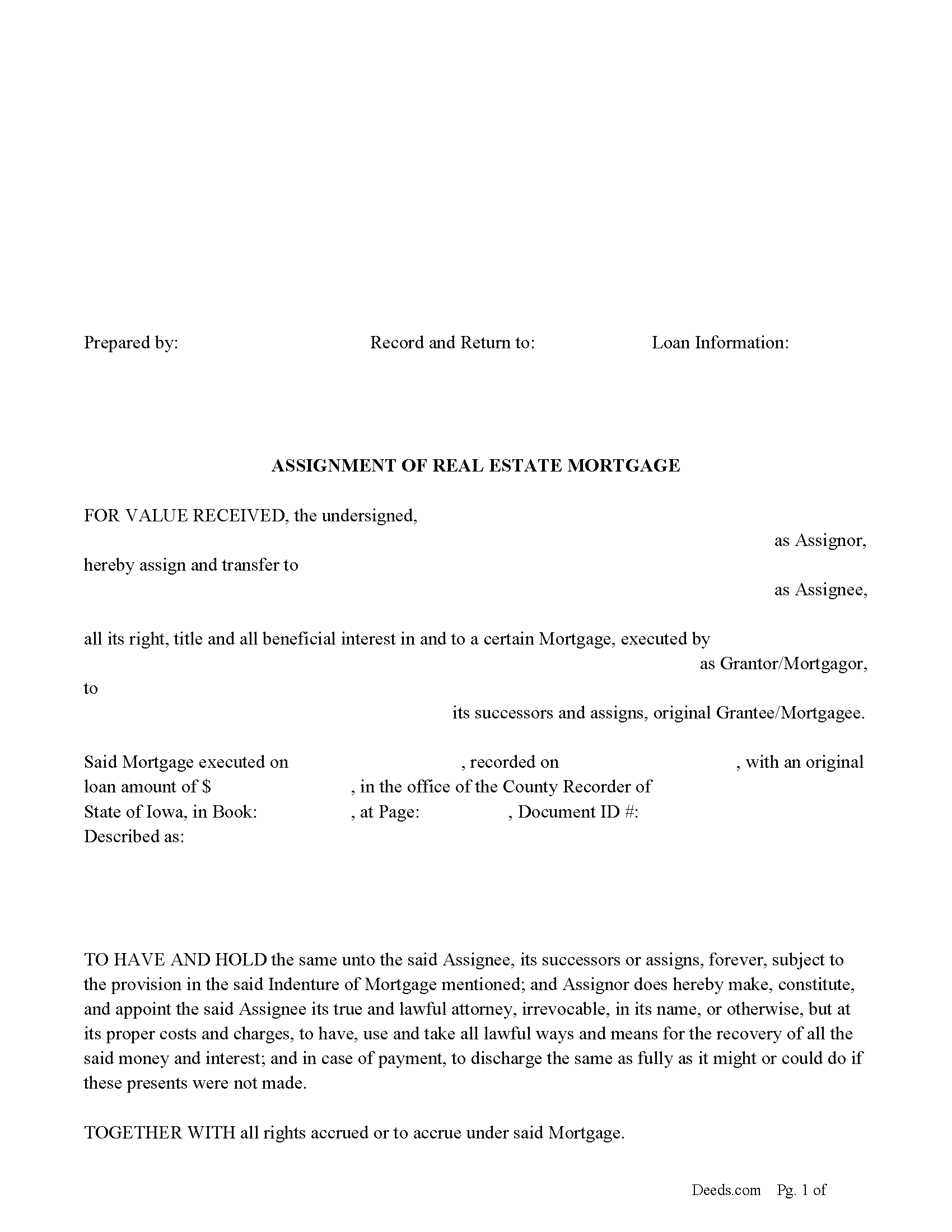
Use this form to assign a previously recorded mortgage to another party/entity/assignee. This is typically done when a mortgage has been sold. By law and to avoid penalty a notice of assignment must forwarded to the current borrowers updating them on the changes in their mortgage status.
(Iowa Assignment of Mortgage Package includes form, guidelines, and completed example) For use in Iowa only
... More Information about the Iowa Assignment of Real Estate Mortgage
General Power of Attorney
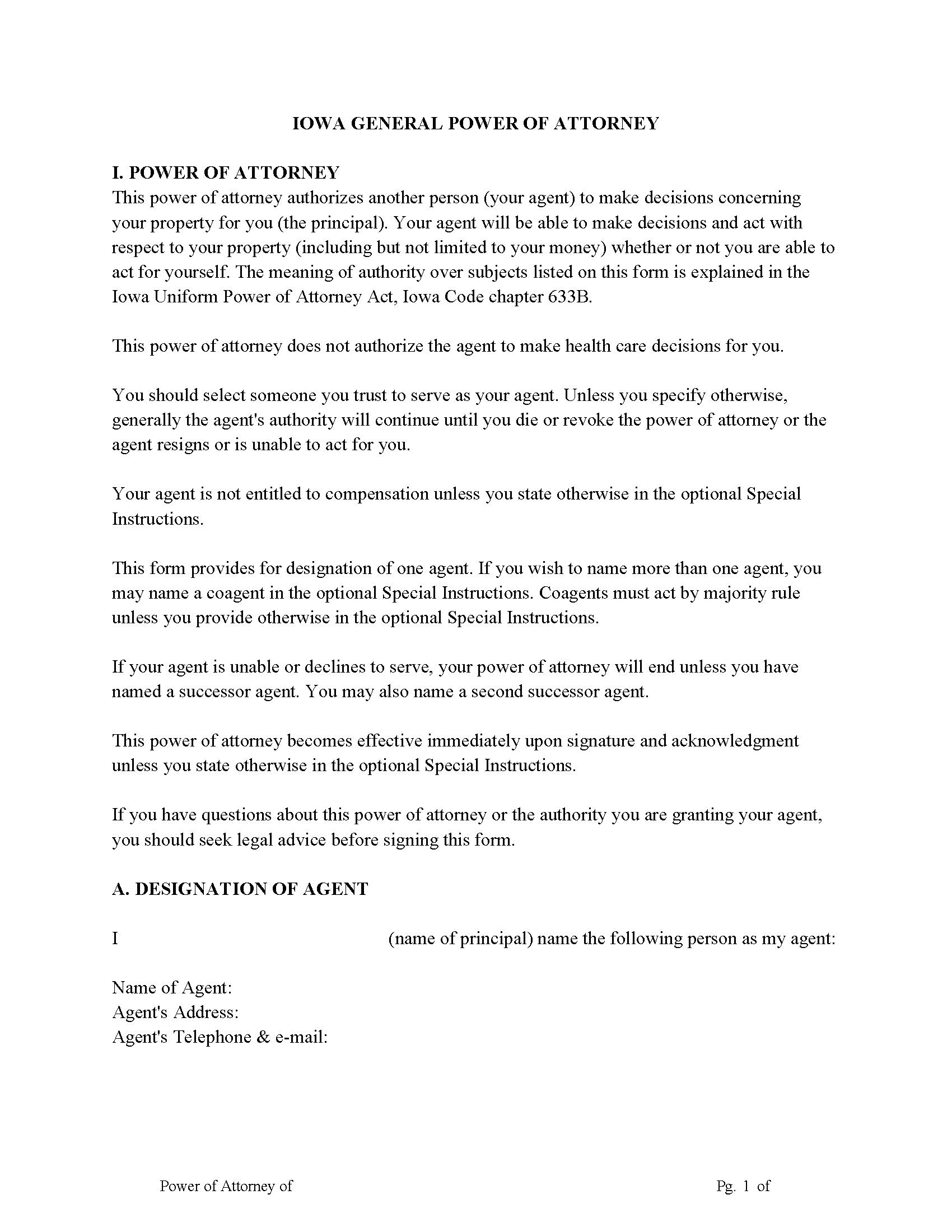
This power of attorney authorizes another person (your agent) to make decisions concerning your property for you (the principal). Your agent will be able to make decisions and act with respect to your property (including but not limited to your money) whether or not you are able to act for yourself. The meaning of authority over subjects listed on this form is explained in the Iowa Uniform Power of Attorney Act, Iowa Code chapter 633B.
Subjects
(______) Real Property (633B.204)
(______) Tangible Personal Property (633B.205)
(______) Stocks and Bonds (633B.206)
(______) Commodities and Options (633B.207)
(______) Banks and Other Financial Institutions (633B.208)
(______) Operation of Entity or Business (633B.209)
(______) Insurance and Annuities (633B.210)
(______) Estates, Trusts, and Other Beneficial Interests (633B.2I I)
(______) Claims and Litigation (633B.212)
(______) Personal and Family Maintenance (633B.213)
(______) Benefits from Governmental Programs or Civil or Military Service (633B.214)
(______) Retirement Plans (633B.215)
(______) Taxes (633B.216)
(Iowa POA Package includes form, guidelines, and completed example)
... More Information about the Iowa General Power of Attorney
Limited Power of Attorney for the Purchase of Real Property
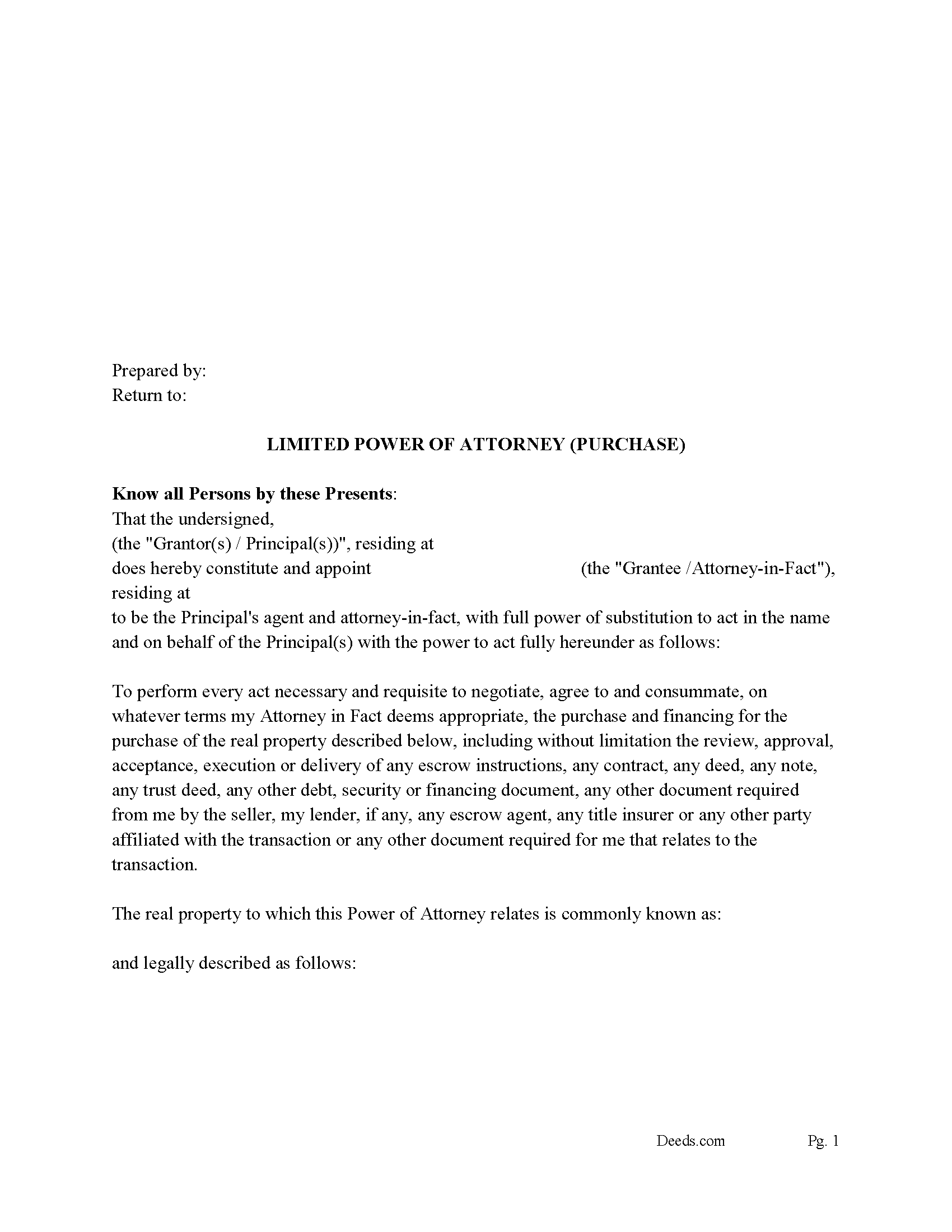
Use this Limited Power of Attorney to appoint an Agent to purchase a specific property. In this form the principal empowers the agent to perform every act necessary and requisite to negotiate, agree to and consummate, on whatever terms your agent deems appropriate, the purchase and financing for the purchase of the real property described, including without limitation the review, approval, acceptance, execution or delivery of any escrow instructions, any contract, any deed, any note, any trust deed, any other debt, security or financing document, any other document required from you by the seller, your lender, if any, any escrow agent, any title insurer or any other party affiliated with the transaction or any other document required for you that relates to the specific transaction
This form (must be signed by the principal(s)or in the principal's conscious presence by another individual, other than any prospective agent, directed by the principal to sign the principal's name on the power of attorney. A power of attorney must be acknowledged before a notary public or other individual authorized by law to take acknowledgments. An agent named in the power of attorney shall not not... More Information about the Iowa Limited Power of Attorney for the Purchase of Real Property
Limited Power of Attorney for the Sale of Real Property
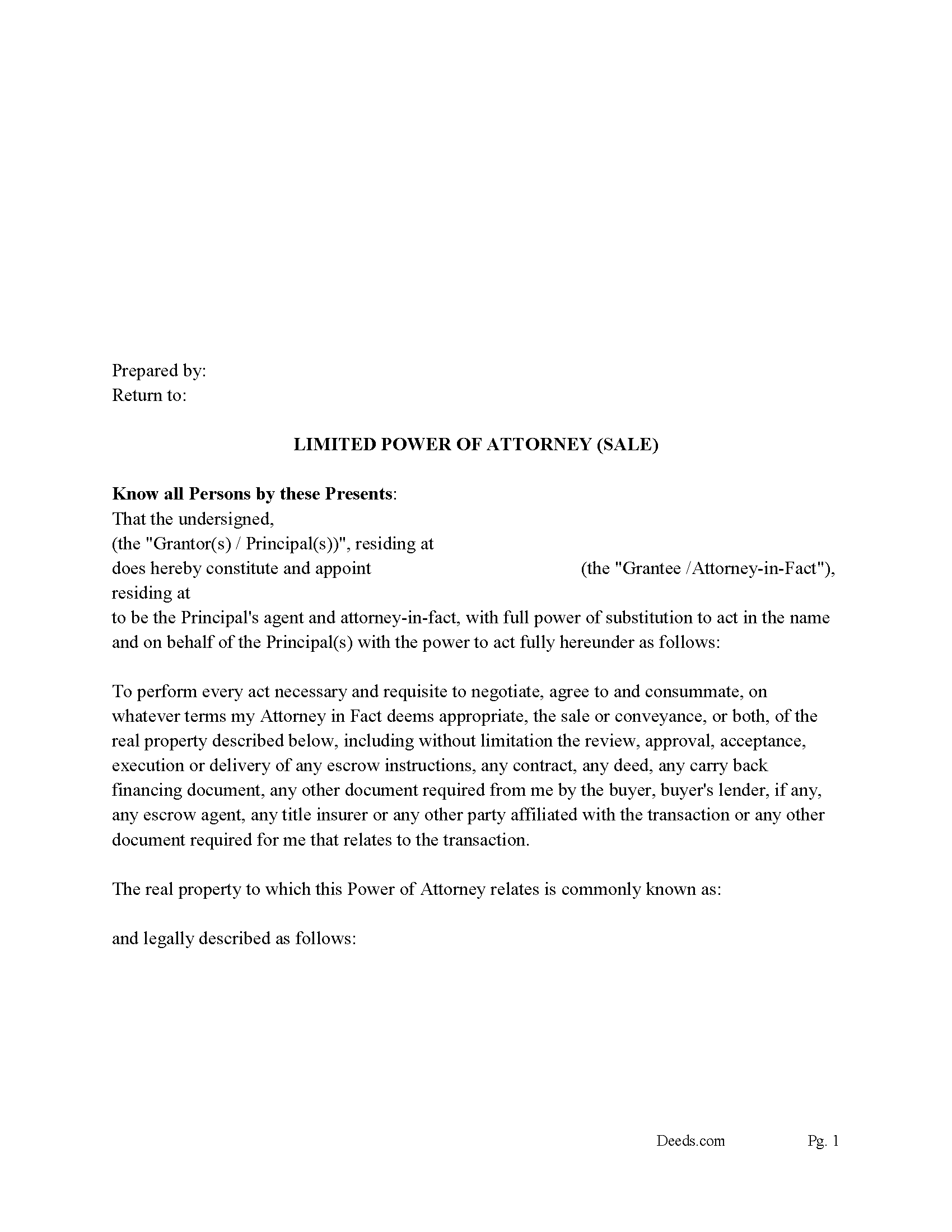
Use this Limited Power of Attorney to appoint an Agent to sell a specific property. In the form the principal empowers the agent to perform every act necessary and requisite to negotiate, agree to and consummate, on whatever terms your Attorney in Fact deems appropriate, the sale or conveyance, or both, of the real property described, including without limitation the review, approval, acceptance, execution or delivery of any escrow instructions, any contract, any deed, any carry back financing document, any other document required from you by the buyer, buyer's lender, if any, any escrow agent, any title insurer or any other party affiliated with the transaction or any other document required for you that relates to the transaction.
This power of attorney is not affected by any subsequent disability or incapacity of the principal and shall be considered a "Durable Power of Attorney." (ii) shall be governed, as to its validity, terms and enforcement, by those laws of the State of Iowa that apply to instruments negotiated, executed, delivered and performed solely within the State of Iowa.
Once completed this Limited Power of Attorney is recorded in the County where the subject ... More Information about the Iowa Limited Power of Attorney for the Sale of Real Property
Disclaimer of Interest
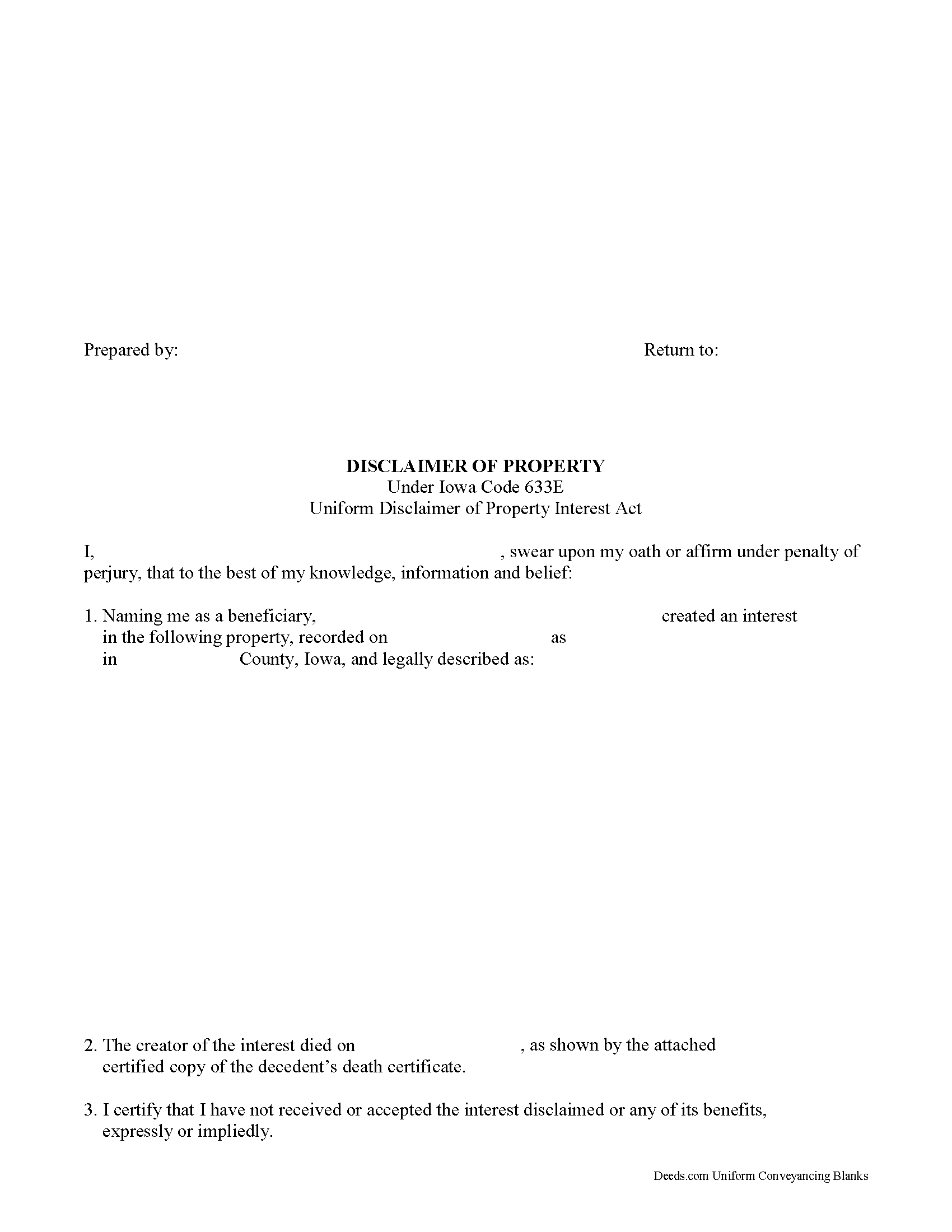
Under the Iowa Code, the beneficiary of an interest in property may renounce the gift, either in part or in full (Chapter 633E Uniform Disclaimer of Property Interest Act). Note that the option to disclaim is only available to beneficiaries who have not acted in any way to indicate acceptance or ownership of the interest.
The disclaimer must be in writing and include a description of the interest, a declaration of intent to disclaim all or a defined portion of the interest, and be signed by the disclaimant (633E.5 (3)).
Deliver the disclaimer within nine months of the transfer (e.g., the death of the creator of the interest) to the personal representative of the decedent's estate, or with the court that has the power to appoint such a person (633E.12 (3)). In the case of real property, record a copy of the disclaimer in the office of the county recorder in the county or counties where the real estate is located (633E.13 (a)).
A disclaimer is irrevocable and binding for the disclaiming party and his or her creditors, so be sure to consult an attorney when in doubt about the drawbacks and benefits of disclaiming inherited property. If the disclaimed interest arises out o... More Information about the Iowa Disclaimer of Interest
Certificate of Trust
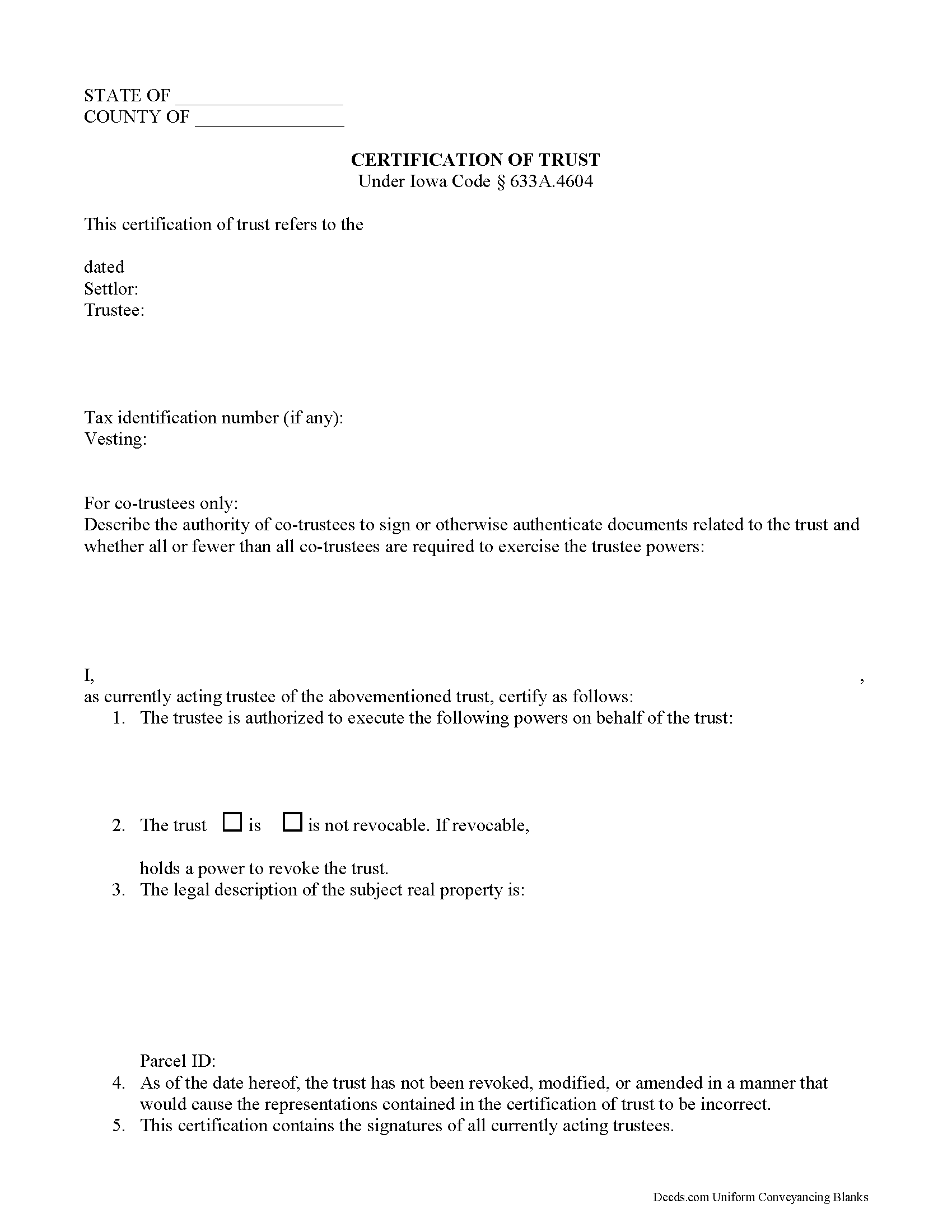
Under Iowa Code 633A.4604, the certification of trust is an official document confirming the terms of a trust as they relate to a specific transaction. Trustees wishing to enter into a transaction in the trust's name may be asked to present a certification of trust to prove the trust's existence and the trustee's authority to enter into the transaction.
A certificate of trust presents the name and date of the trust under which the trustee is acting, as well as the identities of the trust's settlor and trustees. The document provides the name by which the trust will hold title to trust assets, and includes the trust's taxpayer identification number (TIN).
If there is more than one trustee, the certificate identifies who has authority to sign documents relating to the trust and how many co-trustees are required to sign. The document also enumerates the trustee's powers relative to the transaction at hand, and includes the name of any person able to revoke the trust, if applicable. Like other documents affecting real property, the certificate should include the legal description of the subject property.
Finally, the certificate requires statements that the trust has not be... More Information about the Iowa Certificate of Trust
Contractor Notice to Owner
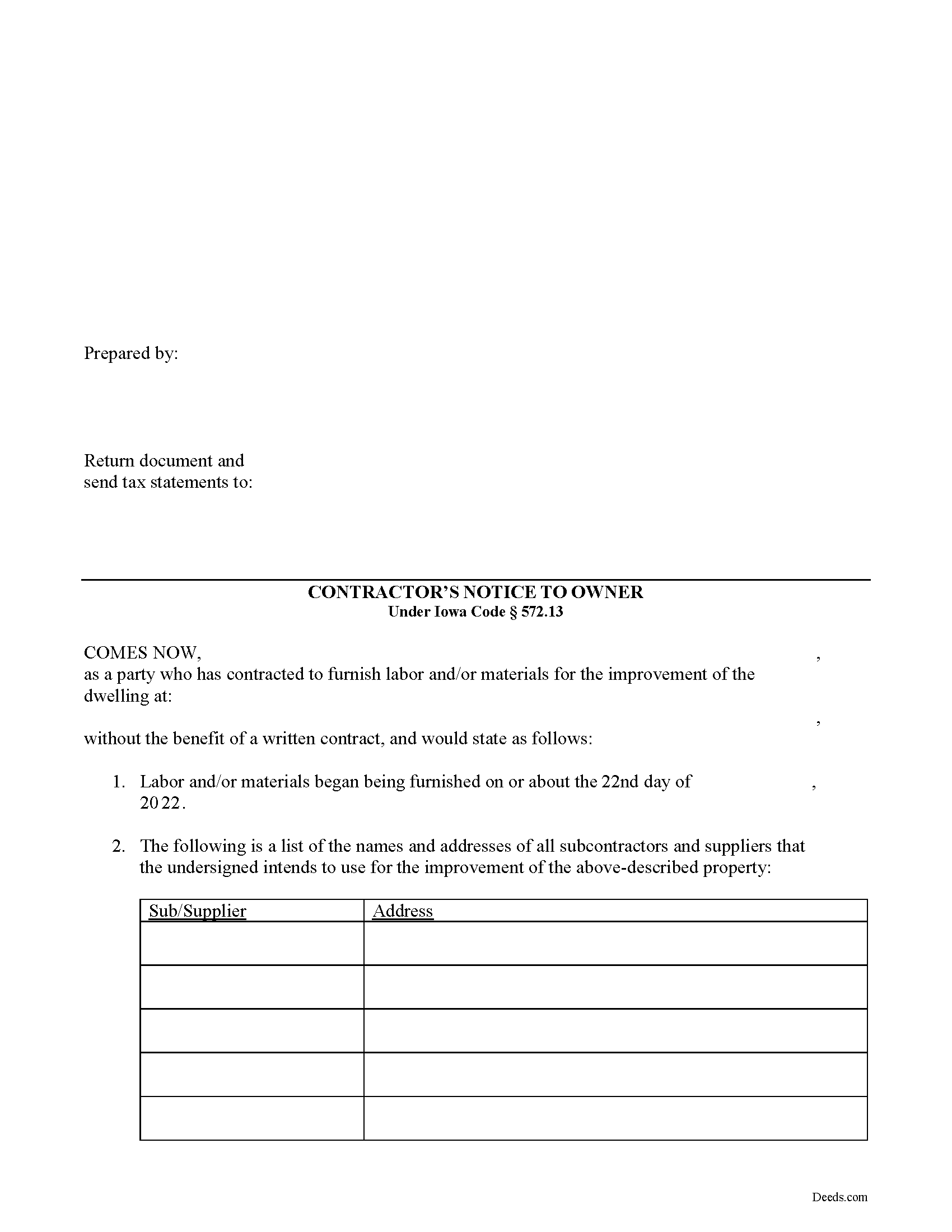
Liability of an Owner to the Original Contractor in Iowa
An owner of a building, land, or improvement upon which a subcontractor's mechanic's lien may be filed, is not required to pay the original contractor any compensation for work done or material furnished for the building, land, or improvement until the expiration of ninety (90) days after the completion of the building or improvement. I.C. 572.13(1). However, payment may be due sooner if the original contractor furnishes the owner with one of the following: a) receipts and waivers for any claims for mechanics' liens, signed by all persons who furnished material or performed labor for the building, land, or improvement; or b) good and sufficient bond to be approved by the owner, on the condition that the owner will be relieved from liability for any loss which the owner may sustain by reason of the filing of mechanics' liens by subcontractors. I.C. 572.13(1).
An original contractor entering into a contract for an owner-occupied dwelling and who has contracted or will contract with a subcontractor to provide labor or furnish material for the dwelling must include the following notice in any written contract with the owner... More Information about the Iowa Contractor Notice to Owner
Claim of Mechanics Lien
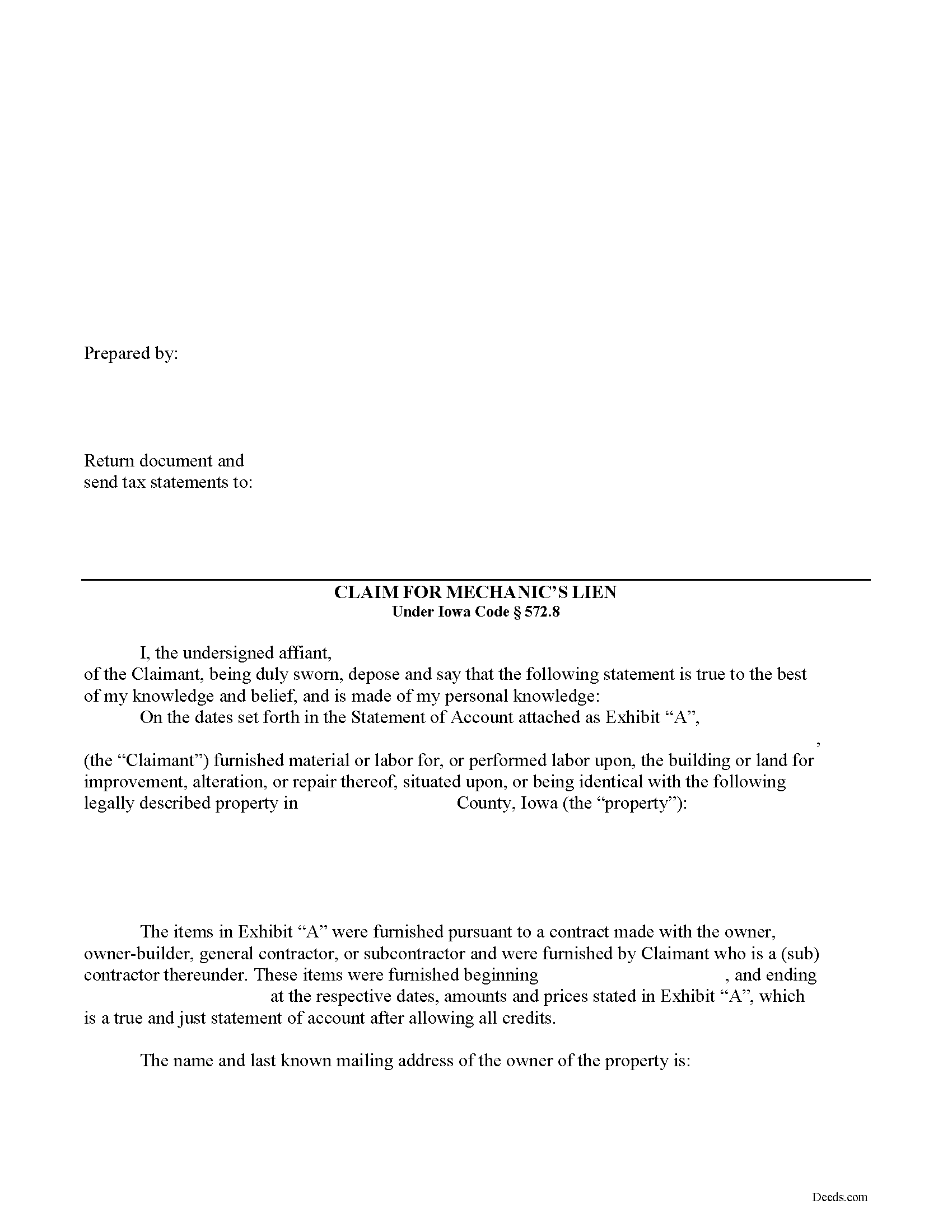
Claiming a Mechanic's Lien in Iowa
Mechanic's liens are used to encumber the title to an owner's property when a contractor, materials supplier, or other laborer such as a subcontractor has not been paid for labor, materials, or equipment provided. In Iowa, this is accomplished by filing a Claim of Lien with the district court.
Iowa law entitles every person who furnishes material or labor for, or performs any labor upon, any building or land for improvement, alteration, or repair thereof, by virtue of any contract with the owner, contractor, or subcontractor to have a lien upon the building or improvement, and land belonging to the owner, to secure payment for the material or labor furnished or labor performed. I.C. 572.2(1).
The entire land upon which any building or improvement is situated, including that portion not covered therewith, shall be subject to a mechanic's lien to the extent of the interest therein of the person for whose benefit such material was furnished or labor performed. I.C. 572.5.
Perfect the lien by filing it with the clerk of the district court of the county in which the building, land, or improvement to be charged with the lien is situated. I.C... More Information about the Iowa Claim of Mechanics Lien
Verified Statement of Account
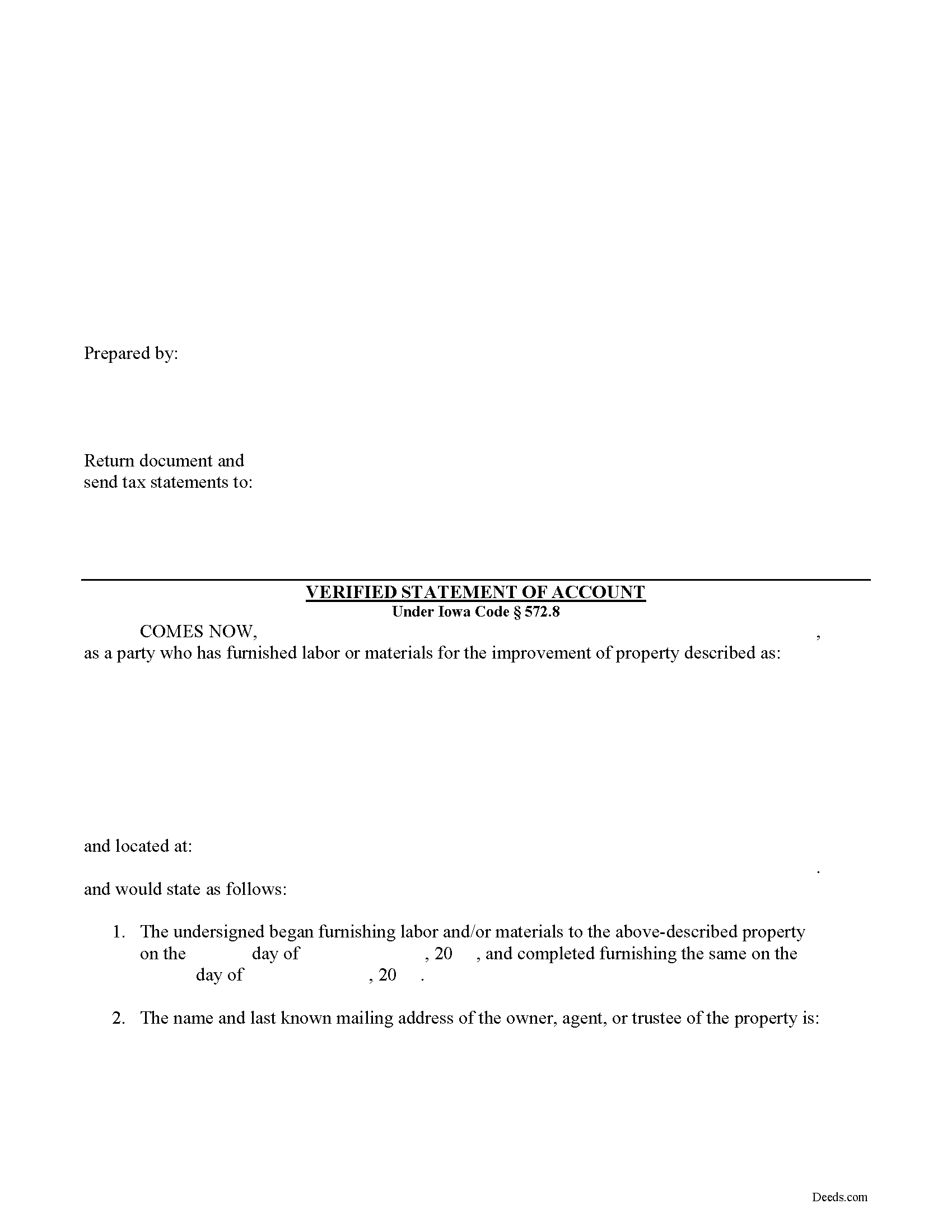
In Iowa, in order to perfect a mechanic's lien, the claimant must make a filing with the clerk of the district court of the county in which the building, land, or improvement to be charged with the lien is situated of a verified statement of account of the demand due the person, after allowing all credits. I.C. 572.8(1).
The verified statement must include: 1) the date when such material was first furnished or labor first performed, and the date on which the last of the material was furnished or the last of the labor was performed; 2) the legal description of the property to be charged with the lien; and 3) the name and last known mailing address of the owner of the property. Id. Once the lien is filed, the clerk of court will mail a copy of the lien to the owner. 572.8(2).
This article is provided for informational purposes only and should not be relied upon as a substitute for the advice from a legal professional. Please contact an Iowa attorney with any questions about the verified statement of account or anything else with regard to mechanic's liens.... More Information about the Iowa Verified Statement of Account
Notice to Primary Contractor
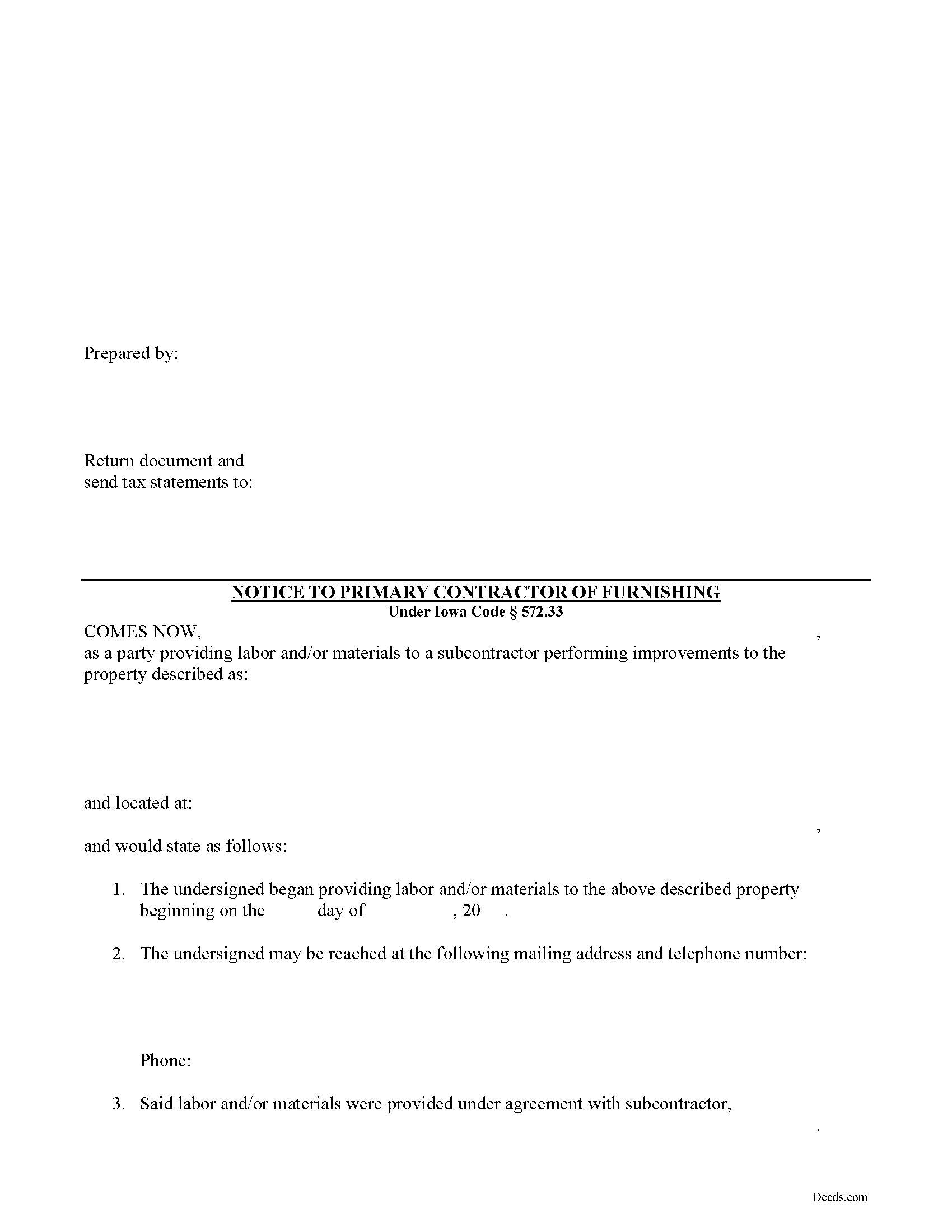
Required Notices to Primary Contractor for Iowa Mechanic's Liens
Persons furnishing labor or materials to a subcontractor (sometimes referred to as "sub-subcontractors or even sub-sub-subcontractors depending on their position in the chain) must send notice to a primary contractor to inform of lien rights in order to preserve their ability to claim a lien.
A person furnishing labor or materials to a subcontractor is not entitled to a lien unless the person furnishing labor or materials notifies the principal contractor in writing with a one-time notice containing: 1) the name, mailing address, and telephone number of the person furnishing the labor or materials, and 2) the name of the subcontractor to whom the labor or materials were furnished, within thirty (30) days of first furnishing labor or materials for which a lien claim may be made. I.C. 572.33(1). Additional labor or materials furnished by the same person to the same subcontractor for use in the same construction project can be covered by this notice. Id.
The person furnishing labor or materials to the subcontractor must also support the lien claim with a certified statement that the principal contractor was noti... More Information about the Iowa Notice to Primary Contractor
Subcontractor Notice to Owner
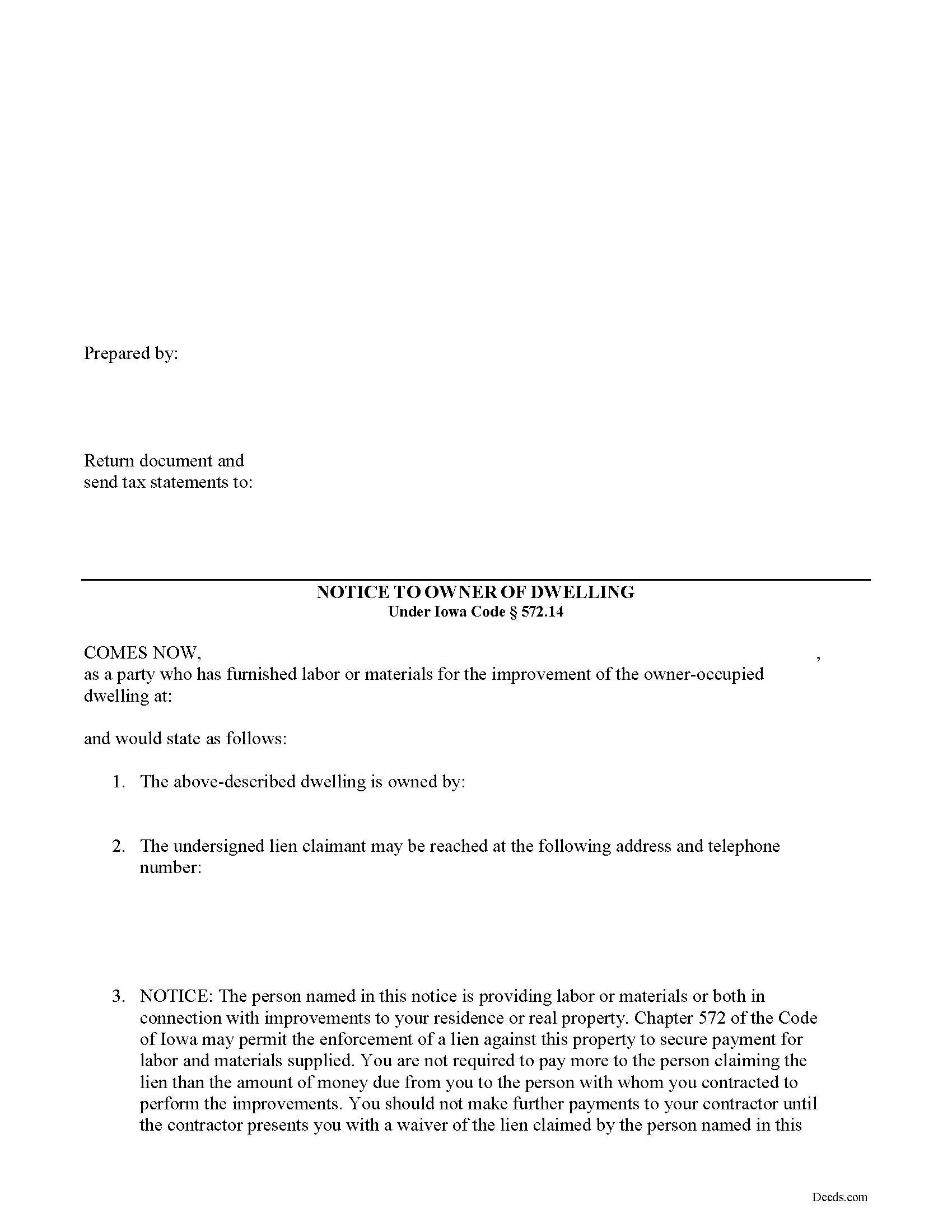
Subcontractors on a construction job occasionally need to fight for payment from the prime contractor. Many property owners are unaware of the participation of lower-tiered contractors on the job. These subcontractors can claim mechanic's lien rights against the property owner even if the owner paid the contractor in full. However, this right only exists if the owner is served proper notice. In turn, after receiving the notice, the owner can rightfully withhold payment from the contractor to ensure these other parties are paid as to avoid any liens against the owner.
A payment to the original contractor by the owner of any part or all of the contract price of the building or improvement within ninety (90) days after the date on which the last of the materials was furnished or the last of the labor was performed by a subcontractor, does not relieve the owner from liability to the subcontractor for the full value of any material furnished or labor performed upon the building, land, or improvement if the subcontractor files a lien within ninety (90) days after the date on which the last of the materials was furnished or the last of the labor was performed. I.C. 572.14(1).
In the... More Information about the Iowa Subcontractor Notice to Owner
Subcontractor Claim of Mechanics Lien
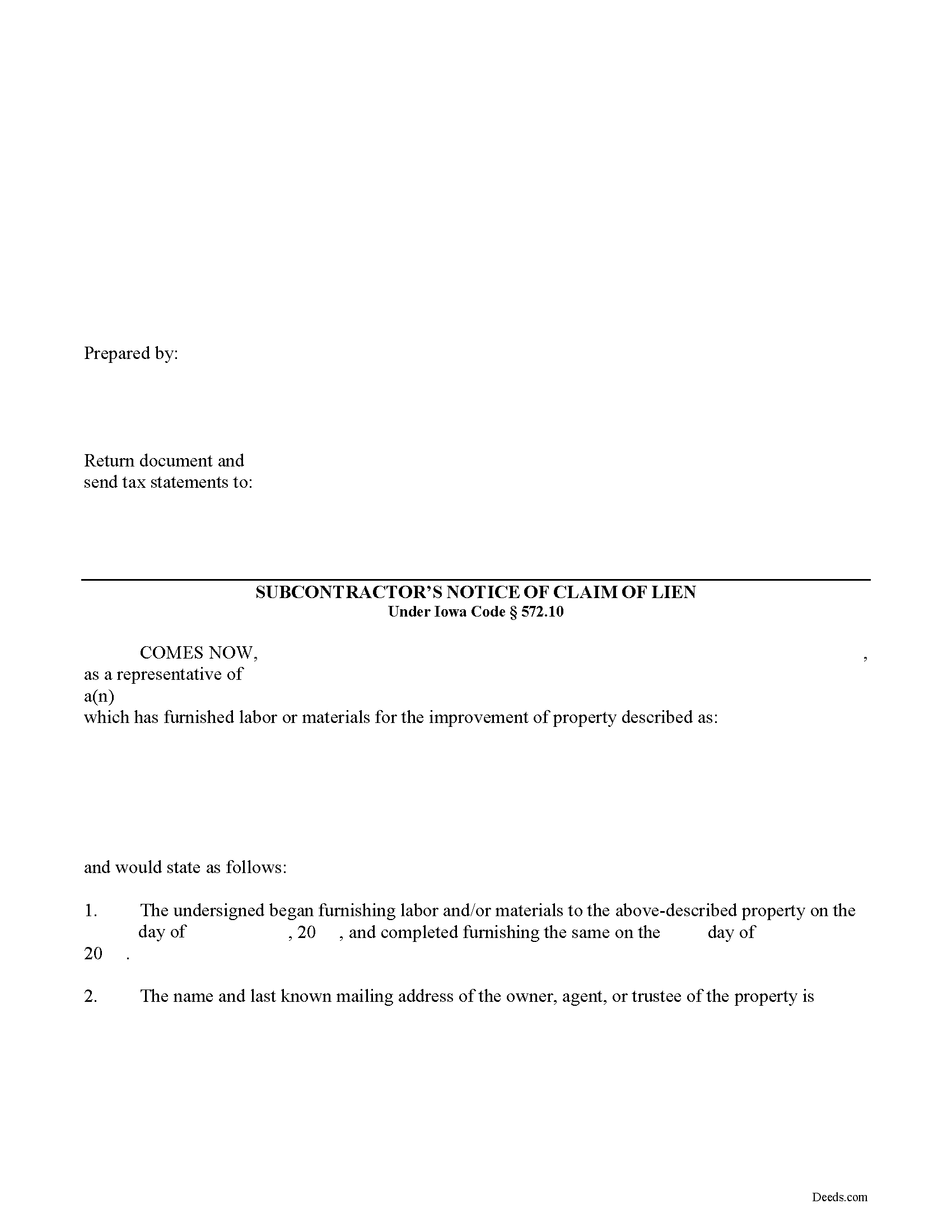
Subcontractor Mechanic's Lien Claims in Iowa
Under 572.10 of Iowa Code, subcontractors are eligible to claim a mechanic's lien. A contractor or a subcontractor may perfect a mechanic's lien beyond ninety (90) days after the date on which the last of the material was furnished or the last of the labor was performed by filing a claim with the clerk of the district court. I.C. 572.10.
A valid claim identifies the parties, the project's location, relevant dates, a list of work and associated charges, any payments, and the amount due. The claimant must provide written notice of such claim to the owner. Id. The notice may be served by any person in the same manner that original notices are required to be served, such as personal service or certified mail. Id. If the party to be served is outside of the county where the property is situated, a return of that fact by the person charged with making such service shall constitute sufficient service from and after the time it was filed with the clerk of the district court. Id.
This article is provided for informational purposes only and should not be considered legal advice or relied upon as a substitute for speaking with a legal pro... More Information about the Iowa Subcontractor Claim of Mechanics Lien
Certificate of Satisfaction
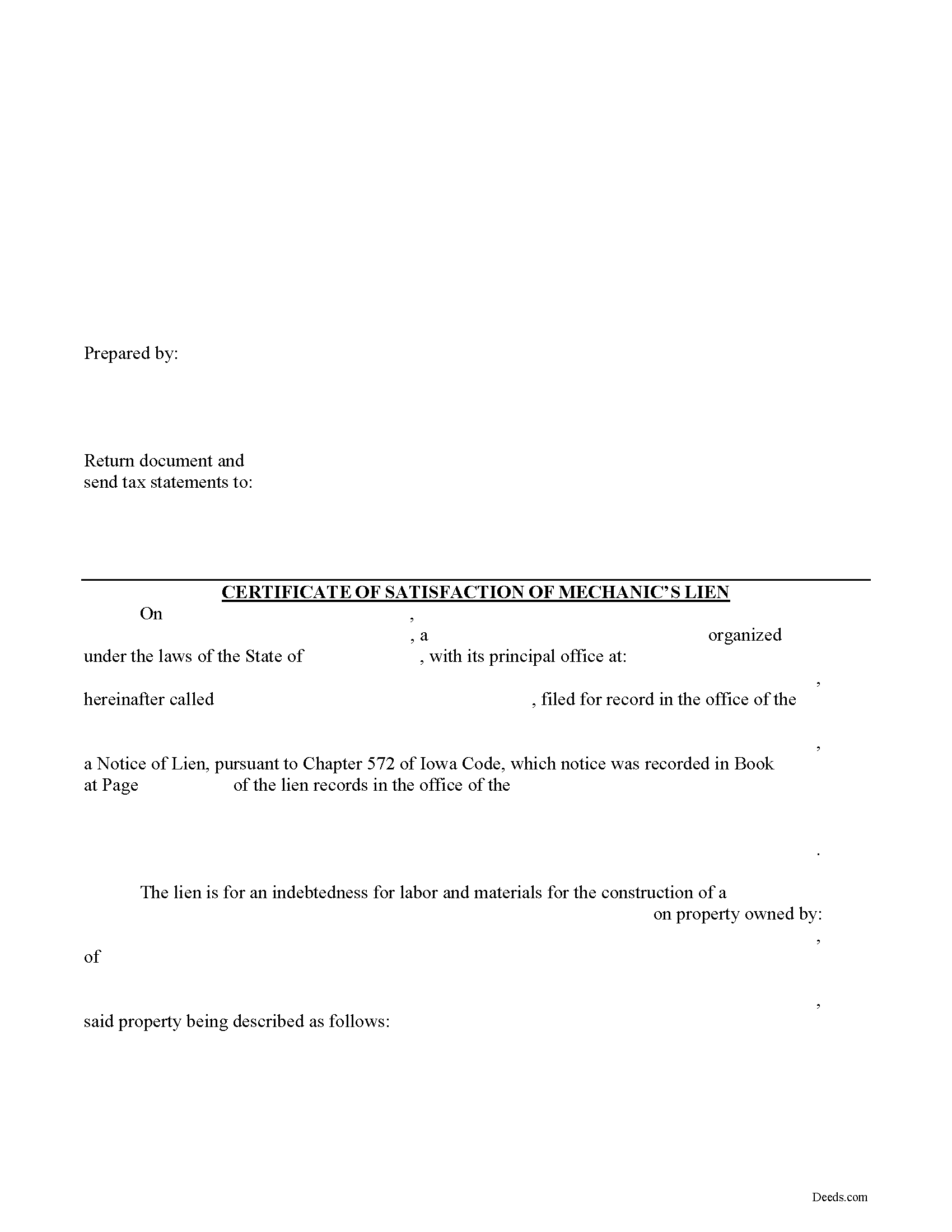
Acknowledging a Satisfied Lien Claim in Iowa
Lien claimants are required to file a certificate of satisfaction under Iowa law when an underlying lien has been paid off or otherwise fully satisfied and the owner has made written demand for its discharge. The certificate instructs the clerk of records to strike the lien from the record upon a sworn statement by the claimant that the lien should be discharged.
When a mechanic's lien is satisfied by payment of the claim, the claimant must acknowledge the liens satisfaction upon the mechanic's lien book, or otherwise in writing, and, if the claimant neglects to do so for thirty (30) days after demand in writing is personally served upon the claimant, the claimant shall forfeit and pay twenty-five dollars to the owner or contractor, and be liable to any person injured to the extent of the injury. I.C. 572.23(1).
If acknowledgment of satisfaction is not filed within thirty (30) of the demand in writing, the party serving the demand or causing the demand to be served may file for record with the clerk of the district court a copy of the demand with proofs of service attached and endorsed and, in case of service by publication, a ... More Information about the Iowa Certificate of Satisfaction
Conditional Lien Waiver upon Progress Payment
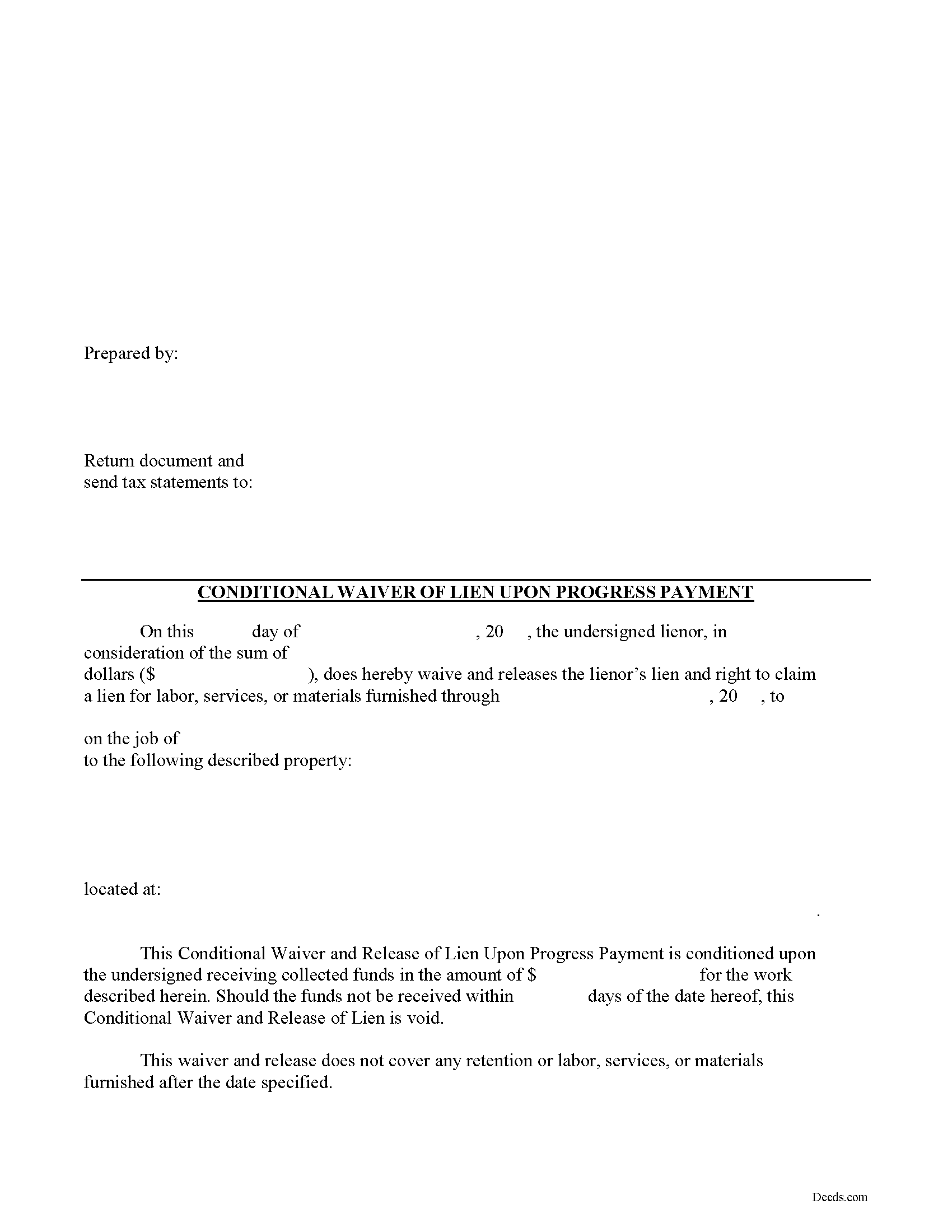
Mechanic's liens are governed under Chapter 572 of Iowa Code. A waiver is a conscious relinquishment of a right. In this case, the person granting the waiver is relinquishing the right to seek a mechanic's lien for all or part of the amount due. This assurance is usually enough to get the other party to pay. In Iowa, there are no statutory forms for waivers although according to the principles of contract law, the parties may agree to such modifications in writing.
Generally, waivers come in four varieties: conditional or unconditional, and based on a partial/progress or final payment. Conditional waivers only become effective after the responsible party's check clears the bank on which it was drawn, and provide more protection for the claimants. Unconditional waivers go into effect immediately, tend to favor the owners' interests, and should only be used after payment is confirmed. Waiving lien rights after a partial payment allows the claimant to retain some lien rights, but to release others based on the amount paid on the overall balance due. Waivers upon final payments remove the claimant's eligibility to place a lien because they state that the account is paid in full.
... More Information about the Iowa Conditional Lien Waiver upon Progress Payment
Unconditional Waiver upon Progress Payment
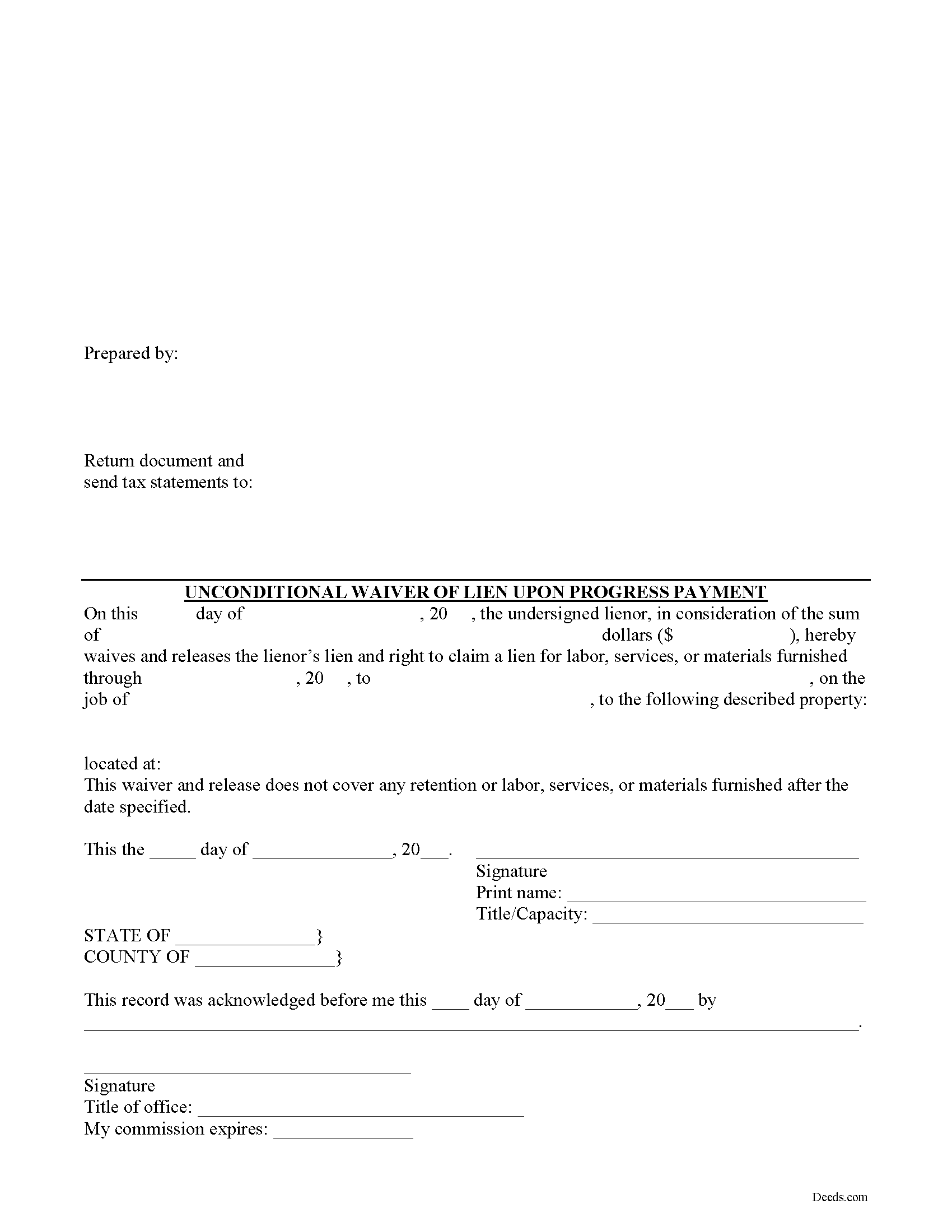
Mechanic's liens are governed under Chapter 572 of Iowa Code. A waiver is a conscious relinquishment of a right. In this case, the person granting the waiver is relinquishing the right to seek a mechanic's lien for all or part of the amount due. This assurance is usually enough to get the other party to pay. In Iowa, there are no statutory forms for waivers although according to the principles of contract law, the parties may agree to such modifications in writing.
Generally, waivers come in four varieties: conditional or unconditional, and based on a partial/progress or final payment. Conditional waivers only become effective after the responsible party's check clears the bank on which it was drawn, and provide more protection for the claimants. Unconditional waivers go into effect immediately, tend to favor the owners' interests, and should only be used after payment is confirmed. Waiving lien rights after a partial payment allows the claimant to retain some lien rights, but to release others based on the amount paid on the overall balance due. Waivers upon final payments remove the claimant's eligibility to place a lien because they state that the account is paid in full.
... More Information about the Iowa Unconditional Waiver upon Progress Payment
Conditional Lien Waiver on Final Payment
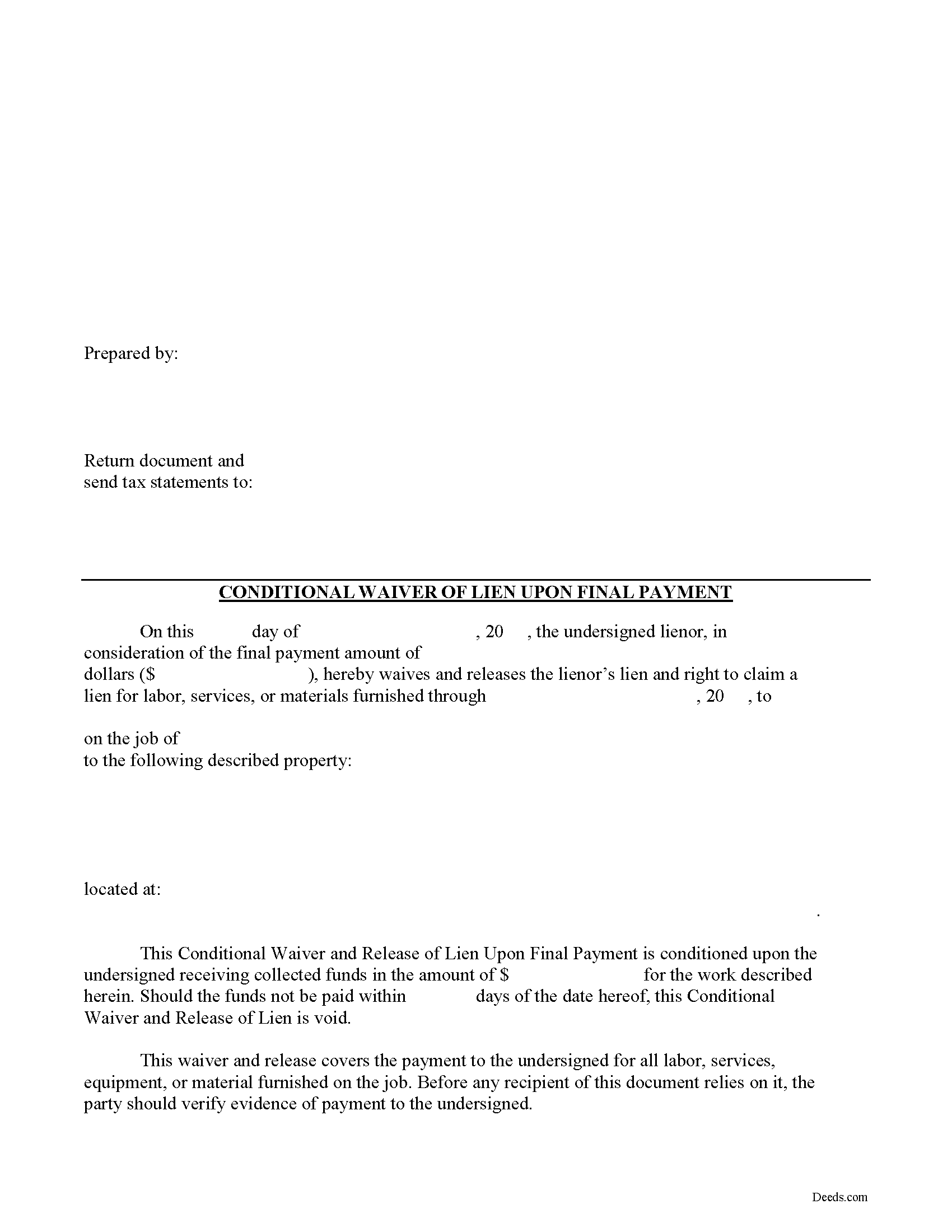
Mechanic's liens are governed under Chapter 572 of Iowa Code. A waiver is a conscious relinquishment of a right. In this case, the person granting the waiver is relinquishing the right to seek a mechanic's lien for all or part of the amount due. This assurance is usually enough to get the other party to pay. In Iowa, there are no statutory forms for waivers although according to the principles of contract law, the parties may agree to such modifications in writing.
Generally, waivers come in four varieties: conditional or unconditional, and based on a partial/progress or final payment. Conditional waivers only become effective after the responsible party's check clears the bank on which it was drawn, and provide more protection for the claimants. Unconditional waivers go into effect immediately, tend to favor the owners' interests, and should only be used after payment is confirmed. Waiving lien rights after a partial payment allows the claimant to retain some lien rights, but to release others based on the amount paid on the overall balance due. Waivers upon final payments remove the claimant's eligibility to place a lien because they state that the account is paid in full.
... More Information about the Iowa Conditional Lien Waiver on Final Payment
Unconditional Waiver on Final Payment
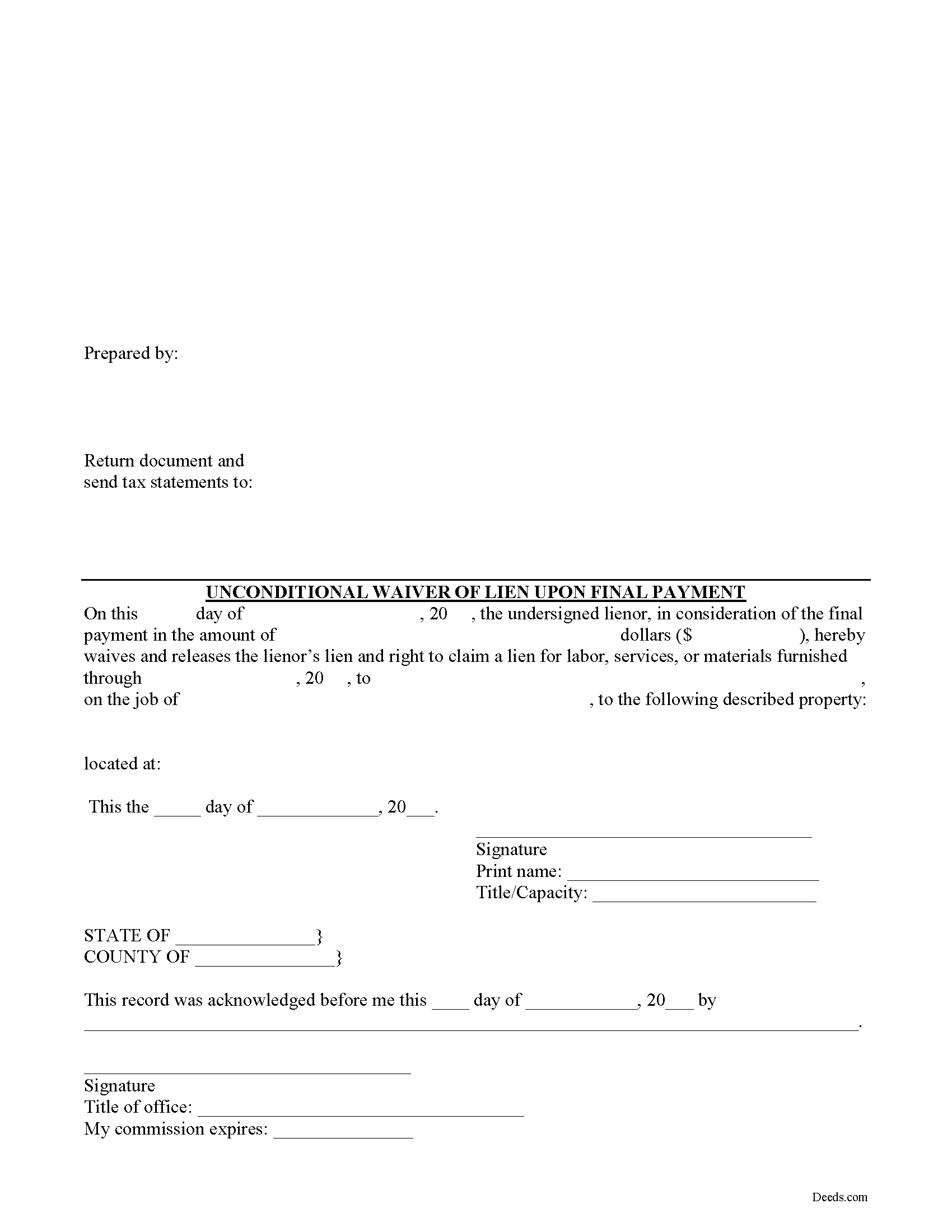
Mechanic's liens are governed under Chapter 572 of Iowa Code. A waiver is a conscious relinquishment of a right. In this case, the person granting the waiver is relinquishing the right to seek a mechanic's lien for all or part of the amount due. This assurance is usually enough to get the other party to pay. In Iowa, there are no statutory forms for waivers although according to the principles of contract law, the parties may agree to such modifications in writing.
Generally, waivers come in four varieties: conditional or unconditional, and based on a partial/progress or final payment. Conditional waivers only become effective after the responsible party's check clears the bank on which it was drawn, and provide more protection for the claimants. Unconditional waivers go into effect immediately, tend to favor the owners' interests, and should only be used after payment is confirmed. Waiving lien rights after a partial payment allows the claimant to retain some lien rights, but to release others based on the amount paid on the overall balance due. Waivers upon final payments remove the claimant's eligibility to place a lien because they state that the account is paid in full.
... More Information about the Iowa Unconditional Waiver on Final Payment